Minimalism
Top 10 Minimalist Living Tips to Reign in Your Budget

Are you interested in tightening your budget? Check out our top 10 minimalist living tips to help you out.
Did you know that the average American household spends over $1,000 a month on non-essential items? By adopting a minimalist lifestyle, we can help you save money and simplify your life.
From decluttering your living space to embracing mindful spending habits, these practical tips will help you prioritize experiences over possessions and achieve financial freedom.
Let’s get started on your journey to a more minimalist and budget-friendly life.
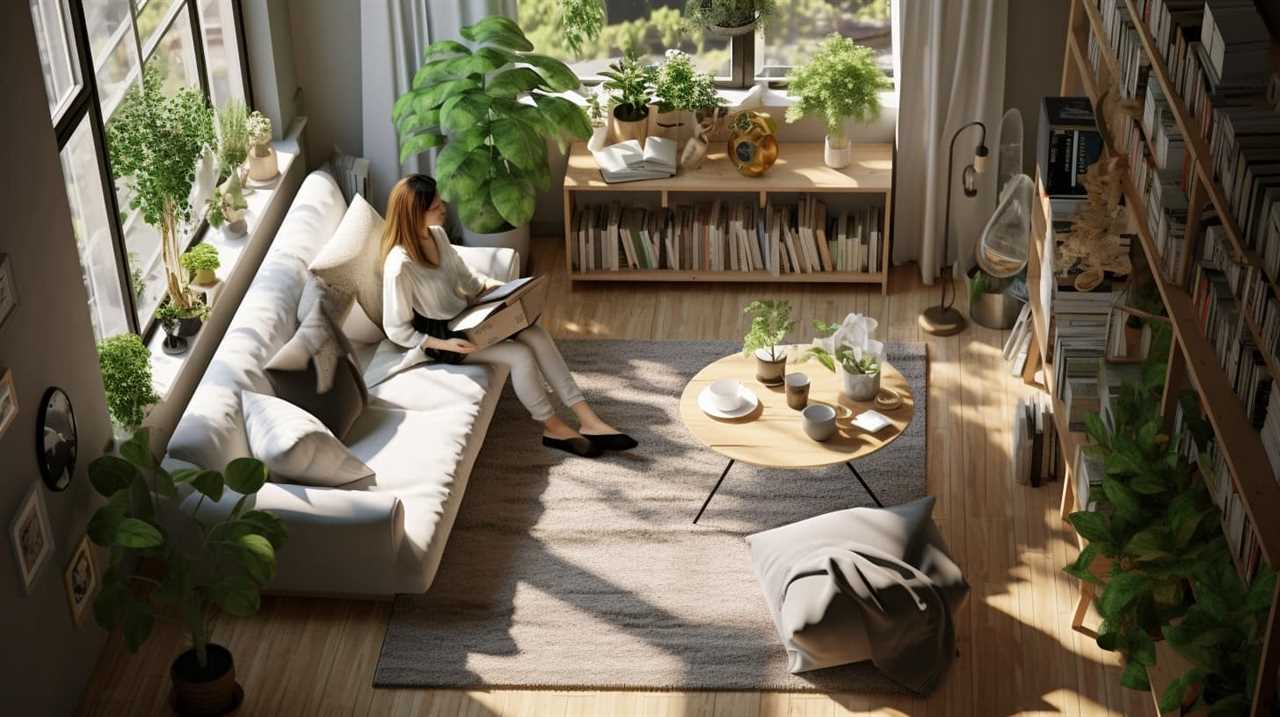
Key Takeaways
- Identify unnecessary or joyless items to create a clutter-free and peaceful environment.
- Embrace a capsule wardrobe and curate versatile and high-quality clothing items to save time and reduce decision fatigue.
- Create a realistic budget, practice delayed gratification, and prioritize spending to take control of your finances.
- Evaluate viewing habits, cut down on monthly subscriptions, and explore lower cost or free streaming services to reduce expenses.
Declutter Your Living Space
To effectively declutter our living space, we should start by identifying items that are no longer necessary or bring us joy.
Minimalist home organization is all about creating a space that’s free from unnecessary clutter and promotes a sense of calm and simplicity.
By getting rid of items that no longer serve a purpose or bring us happiness, we can create a more peaceful and organized living environment.
Minimalist furniture design plays a crucial role in this process, as it focuses on clean lines, simplicity, and functionality.

Opting for furniture pieces that serve multiple purposes or have hidden storage can help maximize space and reduce visual clutter.
Adopt a Minimalist Wardrobe
When it comes to adopting a minimalist wardrobe, there are two key points to consider: capsule wardrobe essentials and decluttering for minimalism.
A capsule wardrobe is a curated collection of versatile, high-quality clothing items that can be mixed and matched to create various outfits.
Capsule Wardrobe Essentials
Although we may feel overwhelmed by the idea of decluttering our wardrobes, adopting a minimalist wardrobe can greatly simplify our lives and save us money. A capsule wardrobe consists of a small collection of versatile, high-quality clothing items that can be mixed and matched to create a variety of outfits. By embracing minimalist fashion trends and curating a capsule wardrobe, we can experience several benefits. Firstly, it helps us save time and reduce decision fatigue by eliminating the need to choose from an overwhelming number of options. Secondly, it allows us to focus on quality over quantity, investing in timeless pieces that will last longer. Lastly, a minimalist wardrobe helps us save money by avoiding impulsive purchases and unnecessary duplicates. To help you get started, here’s a simple guide to building your own capsule wardrobe:

| Essential Clothing Items | Versatile Pieces |
|---|---|
| Classic white shirt | Neutral-colored pants |
| Little black dress | Tailored blazer |
| Dark-wash jeans | Versatile skirt |
Decluttering for Minimalism
As we begin decluttering our wardrobes, let’s remember that adopting a minimalist wardrobe can simplify our lives and save us money.
Decluttering our closets has numerous benefits, including reducing decision fatigue and creating a sense of calm in our daily routines. By removing excess clothing, we can focus on the items that truly bring us joy and serve a purpose in our lives.
Minimalist organizing techniques, such as the KonMari method, encourage us to only keep the clothing that sparks joy and let go of the rest. This approach not only helps us create more space in our wardrobes but also allows us to make more intentional and mindful choices when it comes to our personal style.
Embracing a minimalist wardrobe can lead to a more streamlined and efficient getting ready process, saving us time and energy in the long run.

Embrace Mindful Spending Habits
We can save money by being mindful of our spending habits. Practicing mindful spending and financial discipline can have a significant impact on our budget. Here are some tips to help you embrace mindful spending habits:
-
Create a budget: Take the time to assess your income and expenses and create a realistic budget that aligns with your financial goals. This will help you prioritize your spending and avoid unnecessary purchases.
-
Practice delayed gratification: Before making a purchase, give yourself some time to think it over. Ask yourself if it’s something you truly need or if it’s just an impulse buy. This will help you avoid buyer’s remorse and make more thoughtful decisions.
By adopting these mindful spending habits, you can take control of your finances and make more intentional choices with your money.

Now, let’s explore another way to save money: cutting down on monthly subscriptions.
Cut Down on Monthly Subscriptions
How can we reduce our monthly subscriptions to save money? One effective way is to cut down on cable subscriptions and explore alternative entertainment options. Cable subscriptions can be expensive, and often include channels or services that we don’t even use. By evaluating our viewing habits and considering other options, we can significantly reduce our monthly expenses. Take a look at the table below for a comparison of cable subscriptions and some popular alternative options:
| Cable Subscription | Alternative Options |
|---|---|
| Expensive monthly fees | Lower cost or free streaming services |
| Contract lock-ins | No contracts, cancel anytime |
| Limited channel selection | Wide range of content choices |
| Equipment rental fees | No equipment needed |
| Geographical limitations | Accessible from anywhere |
Focus on Experiences, Not Possessions
Let’s prioritize creating memories and enjoying new adventures rather than accumulating material possessions. Experiential living is about embracing the beauty of the present moment and cherishing the experiences that shape us. By focusing on experiences instead of possessions, we can cultivate a sense of fulfillment and joy that lasts far longer than any material item.
Here are two reasons why experiential living and minimalist travel can have a profound impact on our lives:
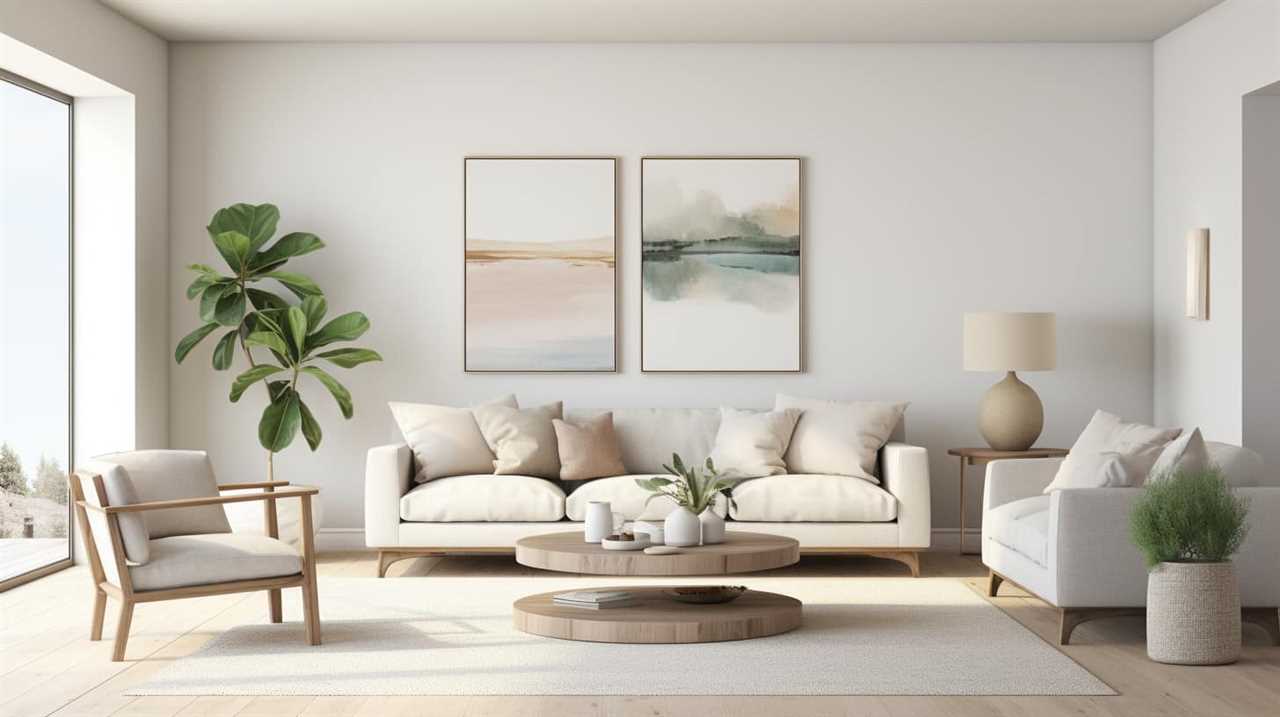
-
Meaningful connections: When we engage in experiential living, we’ve the opportunity to connect with others on a deeper level. Whether it’s exploring a new city together or embarking on a thrilling outdoor adventure, these shared experiences can foster stronger relationships and create lasting memories.
-
Personal growth: Experiential living pushes us outside of our comfort zones, allowing us to learn and grow in ways that possessions simply can’t offer. Through minimalist travel, we discover new cultures, challenge our perspectives, and develop a greater sense of self-awareness.
Create a Budget and Stick to It
Although it may seem daunting at first, creating a budget and sticking to it’s an essential step towards achieving financial stability and living a minimalist lifestyle. When we create a budget, we’re taking control of our finances and making intentional decisions about how we spend and save our money.
It allows us to prioritize our needs and wants, and helps us avoid unnecessary expenses. Financial planning is crucial for anyone seeking to live a simpler, more intentional life. By creating a budget, we can track our income and expenses, identify areas where we can cut back, and set goals for saving and investing.
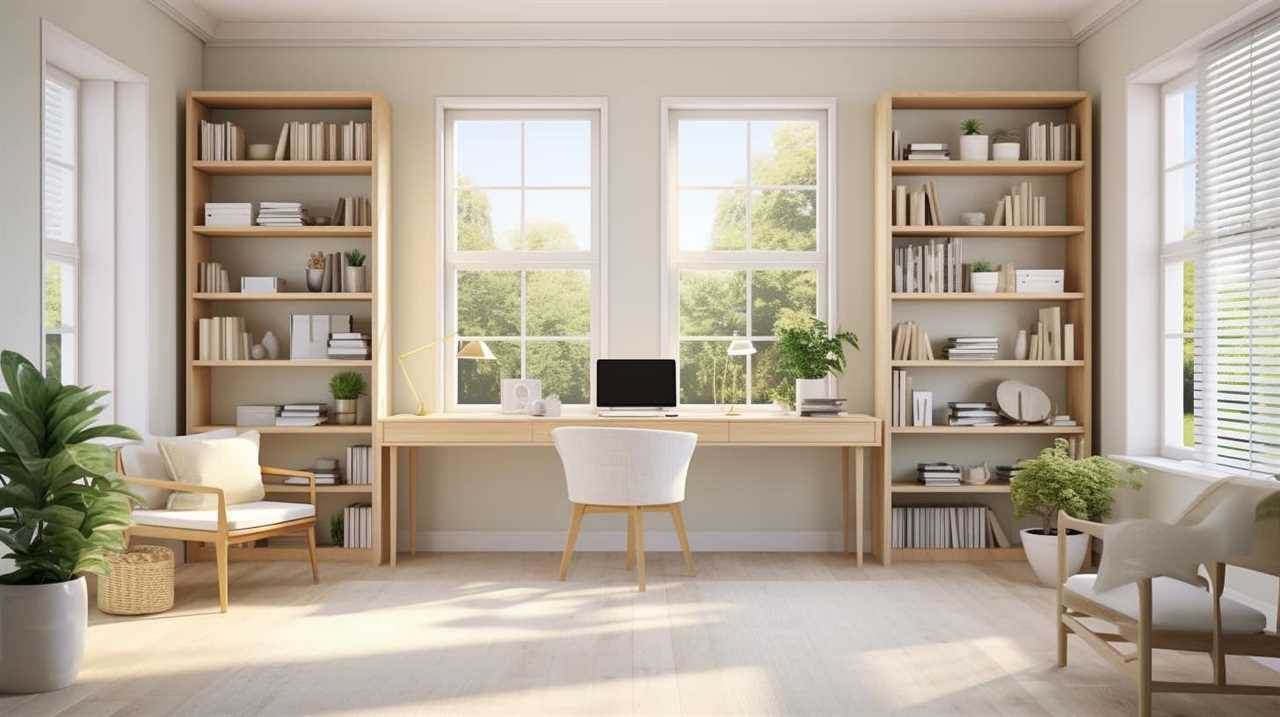
Sticking to our budget requires discipline and self-control, but the rewards are worth it. With careful planning and budgeting, we can achieve our financial goals and live a more minimalist and fulfilling life.
Reduce Food Waste and Grocery Expenses
We can cut down on food waste and save money on groceries by meal planning and sticking to our shopping list. Planning our meals in advance allows us to buy only what we need, reducing the chances of food going to waste. By sticking to our shopping list, we avoid impulse purchases and unnecessary items.
Here are some practical tips to help you reduce food waste and save money on groceries:
-
Buy in bulk: Purchasing items in bulk can save money in the long run and reduce packaging waste.

-
Use leftovers creatively: Repurpose leftovers into new meals or freeze them for later use.
-
Embrace imperfect produce: Don’t shy away from blemished fruits and vegetables; they’re just as nutritious and often cheaper.
-
Practice proper storage: Store perishable items correctly to extend their shelf life.
-
Donate excess food: Consider donating excess food to local food banks or shelters.
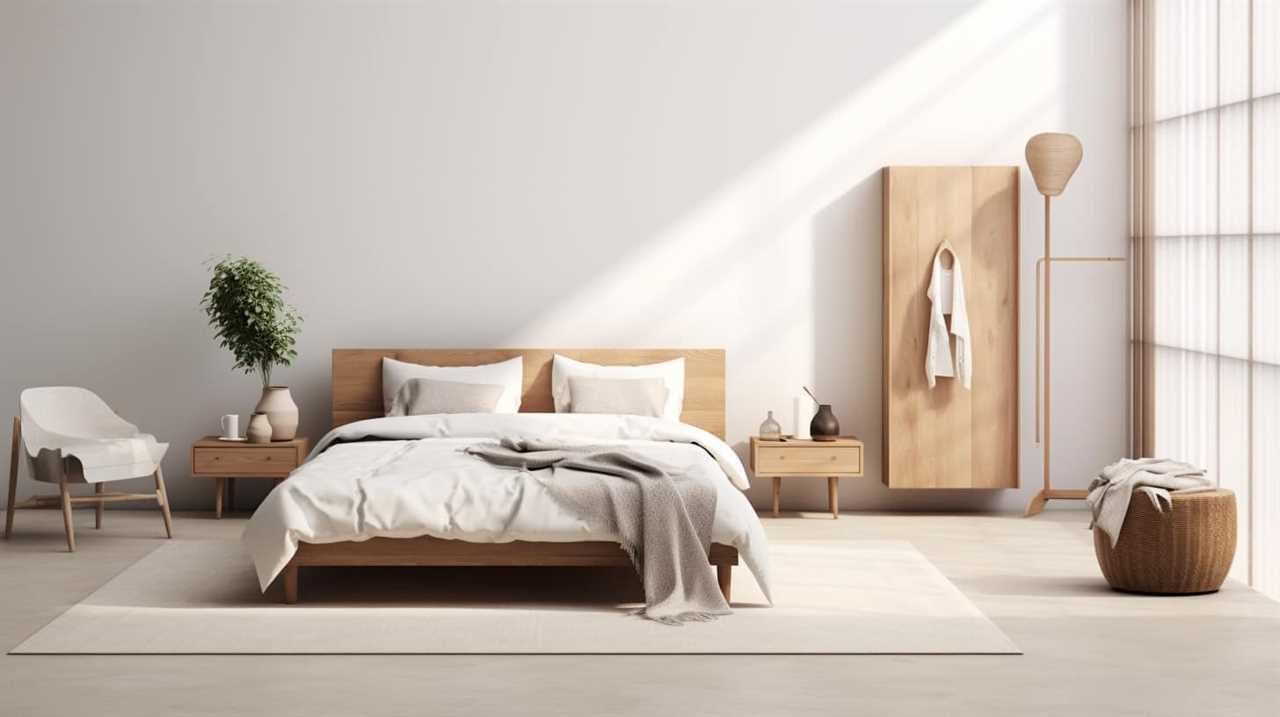
Implementing these tips won’t only save you money but also contribute to reducing food waste and serving others in need.
Choose Quality Over Quantity
When it comes to purchasing items, we should prioritize quality over quantity to ensure long-term satisfaction and avoid unnecessary clutter. Embracing a minimalist lifestyle means being intentional about the things we bring into our lives. By choosing quality over quantity, we can reduce the number of items we accumulate and focus on the ones that truly add value and enhance our lives. To illustrate this point, let’s take a look at the following table:
| Quantity | Quality |
|---|---|
| Many | Few |
| Cheap | Durable |
| Trendy | Timeless |
| Disposable | Long-lasting |
As you can see, the minimalist approach encourages us to opt for fewer, durable, timeless items instead of accumulating a multitude of cheap, trendy, and disposable ones. This not only saves us money in the long run but also helps create a clutter-free and aesthetically pleasing living space. By choosing quality over quantity, we can curate a minimalist decor that reflects our values and brings us joy.
Now that we understand the importance of choosing quality over quantity, let’s move on to the next section and explore how to practice minimalist home decor.

Practice Minimalist Home Decor
Let’s start by decluttering our living space and getting rid of any unnecessary items. By practicing minimalist home decor, we can create a serene and organized environment that promotes a sense of calm and tranquility.
Here are some tips to help you achieve minimalist home organization and minimalist interior design:
- Simplify your color palette: Stick to neutral shades like whites, grays, and browns to create a clean and cohesive look.
- Opt for functional furniture: Choose pieces that serve multiple purposes, such as a storage ottoman or a coffee table with built-in shelves.
- Embrace negative space: Leave empty spaces on shelves and walls to create a sense of openness and simplicity.
- Incorporate natural elements: Bring in plants, wood accents, and natural fibers to add warmth and texture to your space.
Find Free or Low-Cost Entertainment Options
When trying to find free or low-cost entertainment options, there are a few key points to consider.
First, look into free local events such as concerts, festivals, or community gatherings. These can provide a fun and engaging experience without breaking the bank.
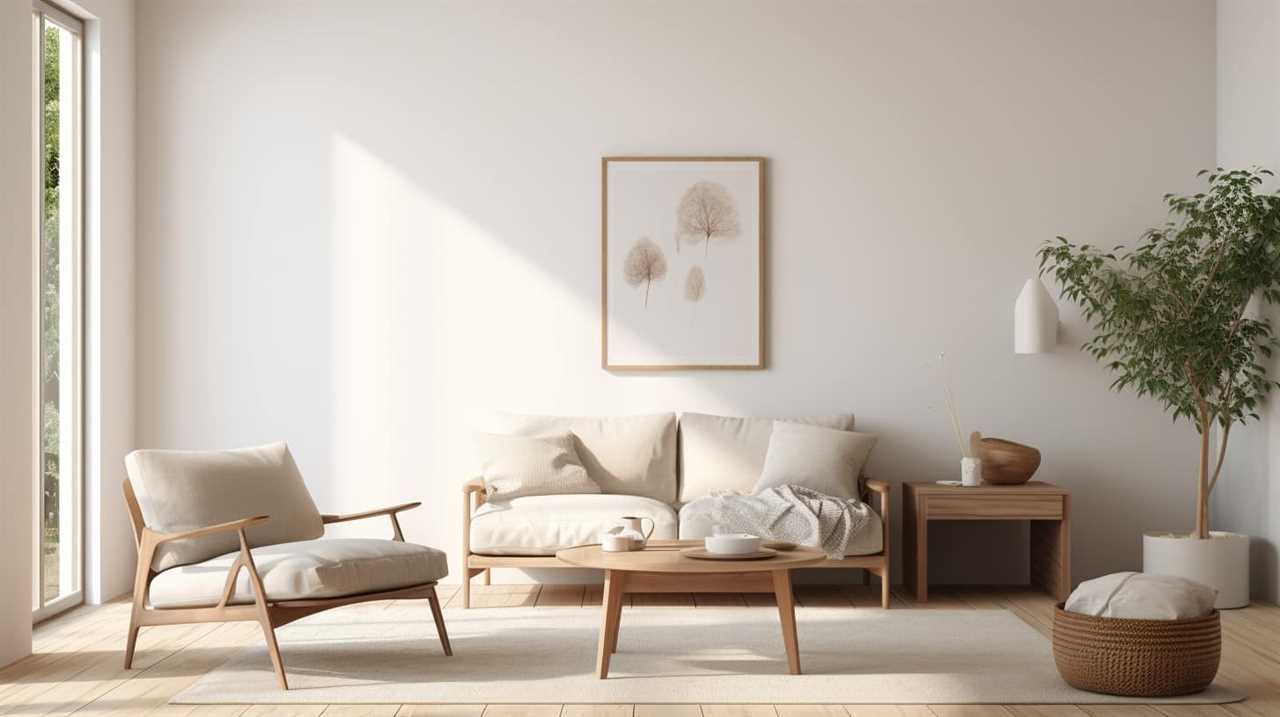
Additionally, consider subscribing to low-cost streaming services that offer a wide range of movies, TV shows, and documentaries for a fraction of the cost of traditional cable or satellite packages.
Free Local Events
We can easily discover and attend free or low-cost local events to enjoy entertainment without breaking our budget. Here are some reasons why taking advantage of free local activities and community events is a great idea:
-
Community connection: Attending these events allows us to connect with our neighbors and build a sense of community, fostering a feeling of belonging and support.
-
Cultural enrichment: Free local events often showcase the talent, art, and culture of our community, providing us with opportunities to broaden our horizons and learn something new.

By participating in these activities, we not only save money but also contribute to the vitality of our community.
Now, let’s explore another budget-friendly entertainment option – low-cost streaming services.
Low-Cost Streaming Services
We can explore various low-cost streaming services to find free or affordable entertainment options.
Streaming services have become increasingly popular in recent years, offering a wide range of movies, TV shows, and documentaries at a fraction of the cost of traditional cable subscriptions.

One option to consider is free streaming platforms such as Tubi, Pluto TV, and Crackle, which offer a selection of movies and TV shows without any subscription fees.
For those who are willing to pay a small monthly fee, services like Netflix, Hulu, and Amazon Prime Video offer a vast library of content, including original series and movies.
Additionally, some streaming services, like Kanopy and Hoopla, are available for free through participating libraries, providing access to a wide range of educational and entertaining content.
Frequently Asked Questions
How Can I Incorporate Minimalist Living Into My Daily Routines?
Incorporating minimalism into our daily routines can be achieved by simplifying home organization. By decluttering our spaces, prioritizing essential items, and adopting mindful consumption habits, we can experience the benefits of minimalist living.

Are There Any Tips for Maintaining a Minimalist Lifestyle While Living With a Family or Roommates?
Maintaining a minimalist lifestyle while living with others can be challenging, but here are some tips to help. Communicate openly about your goals, create designated spaces for belongings, and encourage decluttering as a group activity.
What Are Some Strategies for Dealing With the Emotional Attachment to Possessions When Trying to Downsize?
When it comes to dealing with emotional attachment to possessions and downsizing, we’ve found that strategies for letting go and finding new purpose can be helpful. It’s important to approach it with patience and a willingness to embrace change.
How Can I Resist the Temptation of Impulse Buying and Stick to My Minimalist Budget?
Resisting temptations and sticking to our minimalist budget requires discipline and mindful spending. We can use budgeting techniques such as creating a shopping list, waiting 24 hours before making a purchase, and prioritizing our needs over wants.
Are There Any Resources or Communities That Can Provide Support and Inspiration for a Minimalist Lifestyle?
Are there any resources or communities that can provide support and inspiration for a minimalist lifestyle? Absolutely! We’ve found that there are numerous online platforms and local groups dedicated to helping individuals embrace a minimalist lifestyle.
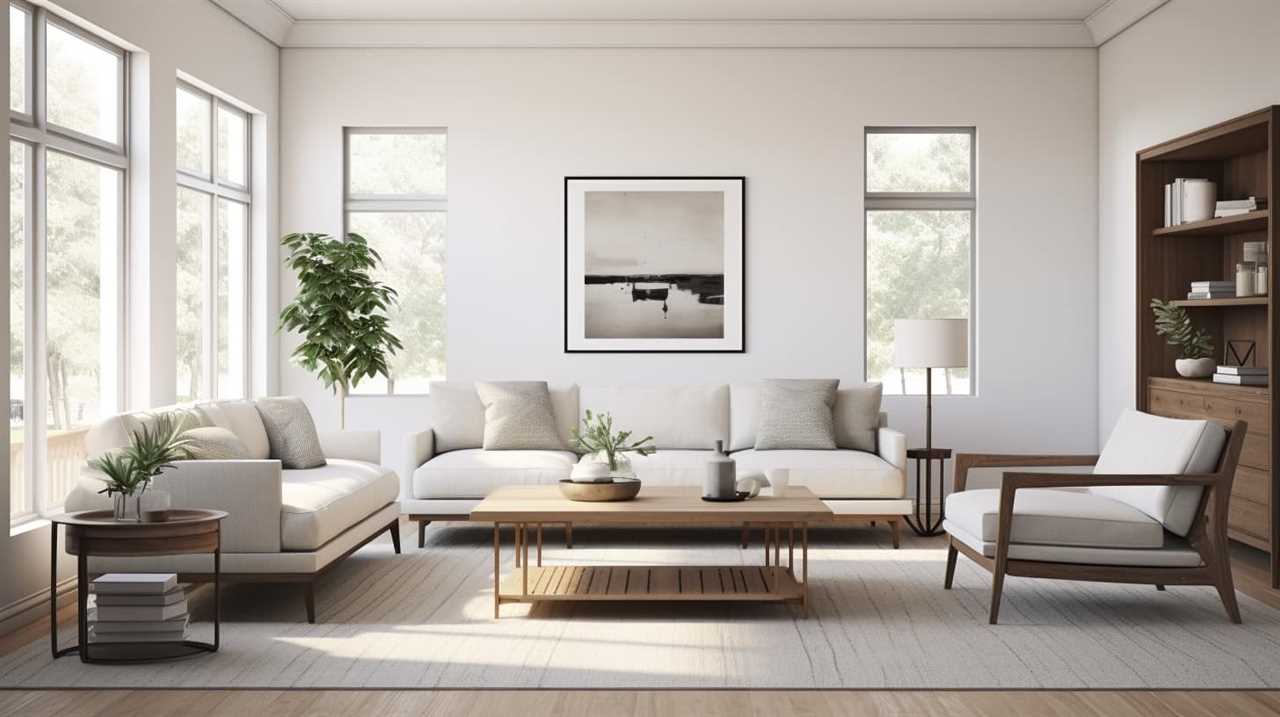
Conclusion
In conclusion, embracing a minimalist lifestyle can have a profound impact on your budget and overall well-being.
Did you know that the average American household spends over $1,000 a year on unused or unnecessary subscriptions? By cutting down on these costs and focusing on experiences rather than possessions, you can save money and find greater satisfaction in life.
Start implementing these minimalist living tips today and watch your budget thrive.
I’m Theodore, and I love tiny houses. In fact, I’m the author of Tiny House 43, a book about tiny houses that are also tree houses. I think they’re magical places where imaginations can run wild and adventures are just waiting to happen.
While tree houses are often associated with childhood, they can be the perfect adult retreat. They offer a cozy space to relax and unwind, surrounded by nature. And since they’re typically built on stilts or raised platforms, they offer stunning views that traditional homes simply can’t match.
If you’re looking for a unique and romantic getaway, a tree house tiny house might just be the perfect option.
Minimalism
Top 10 Key Features of Minimalist Living for an Enriched Life That Will Enhance Your Existence

Are you exhausted by the non-stop rush and busyness of today’s world? Are you yearning for a more peaceful and satisfying life? Well, search no more! Feel refreshed and rejuvenated by embracing a simpler lifestyle.
In this article, we will explore the top 10 key features of minimalist living that will enhance our existence and enrich our lives. From decluttering our physical space to cultivating gratitude and contentment, we will discover the transformative power of embracing simplicity.
Get ready to embark on a journey towards a more intentional and purposeful way of living.
Key Takeaways
- Embracing simplicity and decluttering allows us to focus on what truly matters and brings more joy and fulfillment to our lives.
- Minimalism promotes a peaceful environment by removing unnecessary items and simplifying our surroundings, leading to reduced stress and increased productivity.
- Mindful consumption, including adopting sustainable shopping habits and supporting ethical brands, plays a crucial role in minimalist living and leads to a more fulfilling existence.
- Prioritizing experiences over material possessions and cultivating gratitude for the present moment are key aspects of minimalist living that enhance our overall well-being and bring more fulfillment to our lives.
Embracing Simplicity
We’re all striving for a simpler life that brings us more joy and fulfillment. Living with less and adopting a minimalist mindset is a powerful way to achieve this.

In a society that often glorifies material possessions and constant consumption, embracing simplicity can be a revolutionary act. It allows us to focus on what truly matters, freeing ourselves from the burden of excess stuff and the constant pursuit of more.
By intentionally choosing to live with less, we create space for what truly brings us joy and fulfillment. We learn to appreciate the value of experiences and relationships over material possessions.
Embracing simplicity not only benefits us individually, but it also allows us to serve others more effectively. By living with less, we can redirect our resources towards making a positive impact in the lives of others.
Decluttering Your Physical Space
When it comes to decluttering our physical space, there are numerous benefits that come with embracing minimalism.

By simplifying our surroundings, we create a peaceful environment that allows us to focus on what truly matters.
With less clutter, we can experience a sense of calm, clarity, and freedom in our daily lives.
Benefits of Minimalism
One of the major advantages of minimalism is the remarkable simplicity it brings to our daily lives. By decluttering our physical space, we can experience a range of benefits that enhance our overall well-being.
Here are three significant advantages of adopting minimalism:

-
Financial freedom: Minimalism encourages us to live with less, which means we spend less on unnecessary material possessions. This leads to financial freedom, as we can save more, invest wisely, and focus on experiences that truly matter.
-
Reduced stress: Cluttered spaces can be overwhelming and contribute to feelings of stress and anxiety. Minimalism helps us create a calm and peaceful environment by eliminating unnecessary distractions and allowing us to focus on what truly matters.
-
Increased productivity: When our physical environment is free from clutter, our minds can also feel more organized and focused. This increased clarity and reduced distractions can lead to improved productivity and efficiency in our daily lives.
Creating a Peaceful Environment
Let’s start by decluttering our physical space to create a peaceful environment that promotes relaxation and clarity. A peaceful mindset is essential for a fulfilling life, and one way to cultivate it is through creating a calm and organized living space. Minimalist decor can help us achieve this by removing unnecessary items and simplifying our surroundings.

To illustrate the benefits of decluttering, let’s take a look at the following table:
| Benefits of Decluttering |
|---|
| 1. Reduced stress |
| 2. Increased focus |
| 3. Improved productivity |
| 4. Enhanced creativity |
| 5. Better sleep quality |
Mindful Consumption
When it comes to minimalist living, mindful consumption plays a crucial role in our daily lives.
By adopting sustainable shopping habits, we not only reduce waste and minimize our ecological footprint, but we also contribute to creating a healthier planet for future generations.
Embracing minimalism and practicing mindfulness in our consumption choices allows us to focus on the things that truly matter, leading to a more fulfilling and enriched existence.

Sustainable Shopping Habits
As we strive to live a more minimalist lifestyle, it’s important that we adopt sustainable shopping habits to promote mindful consumption. By making conscious choices when it comes to our purchases, we can minimize our impact on the environment and contribute to a healthier planet.
Here are three eco-friendly alternatives that can help us in our journey towards conscious consumerism:
-
Choose reusable products: Instead of opting for single-use items, such as plastic bags or water bottles, invest in reusable alternatives. This not only reduces waste but also saves money in the long run.
-
Support ethical brands: Look for companies that prioritize sustainability and ethical practices. By supporting these brands, we encourage the production of environmentally friendly products and contribute to fair labor practices.

-
Reduce unnecessary purchases: Before buying something new, ask yourself if you truly need it. Avoid impulse buying and focus on purchasing items that serve a purpose in your life. This helps avoid clutter and reduces the demand for unnecessary goods.
Benefits of Minimalism
One of the key benefits of minimalism is that it allows us to cultivate mindful consumption habits, leading to a more intentional and fulfilling lifestyle. By adopting a minimalist lifestyle, we’re encouraged to question our buying habits and make thoughtful decisions about what we truly need and value. This shift in mindset helps us to break free from the cycle of mindless consumption and excessive materialism.
As a result, we become more aware of our impact on the environment and are able to reduce waste and live more sustainably. Embracing minimalism also allows us to focus on experiences and relationships rather than material possessions, leading to greater contentment and fulfillment in life. Through intentional and mindful consumption, we can create a life that aligns with our values and brings us true joy and satisfaction.
Transitioning into the next section, let’s explore how mindfulness can be incorporated into daily life to enhance the benefits of minimalism.

Mindfulness in Daily Life
By practicing mindful consumption, we can cultivate a deeper awareness of our choices and make more intentional decisions about what we bring into our lives. Mindfulness in daily life involves being present in the moment and fully engaged in our actions.
When it comes to mindful eating, we pay attention to the taste, texture, and aroma of our food, savoring each bite and appreciating the nourishment it provides. Practicing gratitude is another important aspect of mindful consumption. It involves acknowledging and expressing gratitude for the abundance in our lives, including the food we eat.
This mindset of gratitude helps us develop a deeper appreciation for the resources and efforts that go into producing the food we consume. By incorporating mindful eating and practicing gratitude, we can enhance our overall well-being and create a more meaningful connection with the food we consume.
Prioritizing Experiences Over Possessions
We believe that prioritizing experiences over possessions is the key to living a more fulfilling and meaningful life. In a society that constantly emphasizes the accumulation of material possessions, it’s easy to get caught up in the pursuit of more stuff. But true happiness and fulfillment come from the memories we create and the experiences we have, not from the things we own.
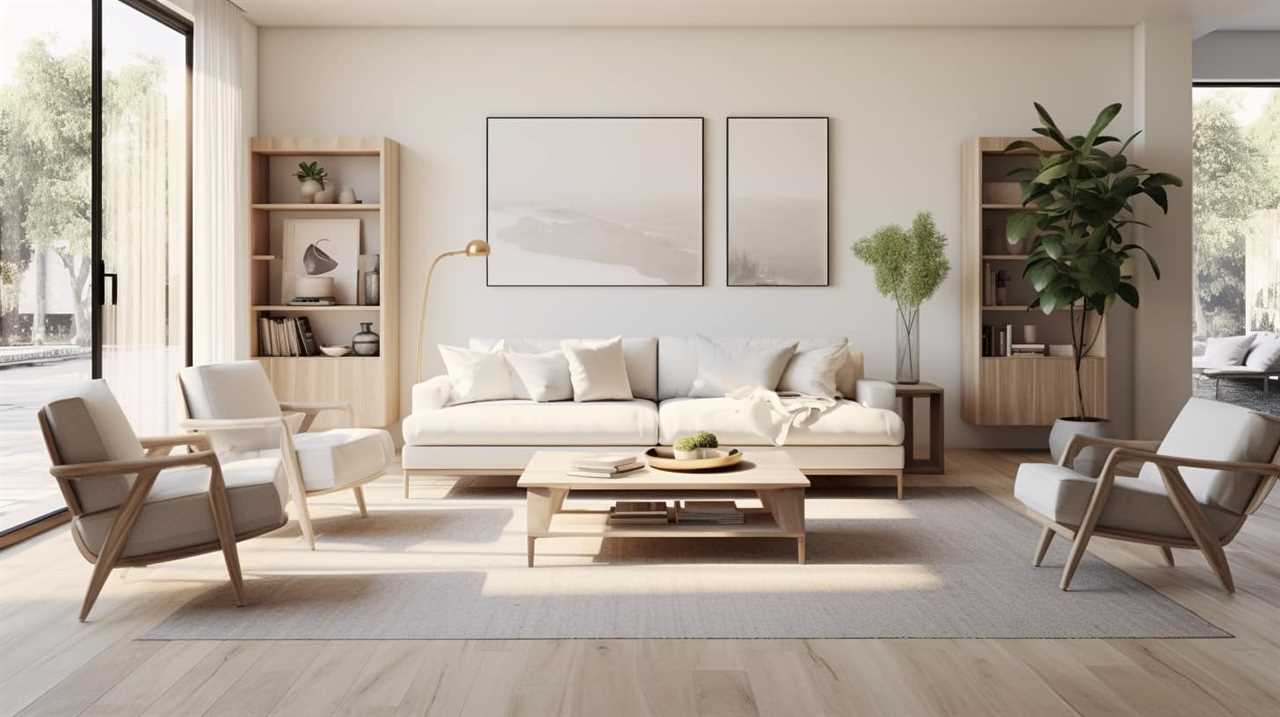
Experiential fulfillment is about cherishing moments, exploring new places, and connecting with others on a deeper level. By shifting our focus from material possessions to experiences, we open ourselves up to a world of endless possibilities and enrich our lives in ways that no amount of stuff ever could.
Now, let’s delve into the next topic of cultivating gratitude and contentment.
Cultivating Gratitude and Contentment
As we strive for a minimalist lifestyle, we can find true fulfillment and joy in cultivating gratitude and contentment within ourselves.
Cultivating gratitude allows us to appreciate the abundance in our lives and shift our focus away from what we lack. It helps us recognize the simple pleasures and blessings that surround us each day.

Finding contentment means embracing the present moment and being satisfied with what we have, rather than constantly chasing after more. It involves letting go of the need for material possessions and external validation, and instead, finding happiness within ourselves.
By nurturing gratitude and contentment, we can experience a greater sense of peace and fulfillment in our lives.
Transitioning into the subsequent section about streamlining daily routines, we can explore how minimalism can help us simplify our lives even further.
Streamlining Daily Routines
Let’s talk about streamlining our daily routines and how it can bring more simplicity and efficiency into our lives.

One key aspect is implementing time-saving organization tips, such as decluttering our spaces and creating designated areas for important items.
Simplifying our morning routines is another way to save time and reduce stress, whether it’s laying out our clothes the night before or planning our breakfasts in advance.
Lastly, efficient meal planning can help us save time and money while ensuring we’ve nutritious meals ready to go.
Time-Saving Organization Tips
By incorporating efficient systems and decluttering our surroundings, we can streamline our daily routines and save valuable time. Here are three time-saving organization tips that will help you manage your time effectively and increase your productivity:

-
Create a daily schedule: Plan your day in advance by creating a detailed schedule. Break down your tasks into manageable chunks and allocate specific time slots for each activity. This will help you stay focused and avoid wasting time on unnecessary tasks.
-
Prioritize your tasks: Identify the most important tasks that need to be done and prioritize them accordingly. Focus on completing these tasks first before moving on to less important ones. This will ensure that you’re making progress on your most important goals and not getting overwhelmed by less critical tasks.
-
Use technology to your advantage: Take advantage of productivity tools and apps that can help you streamline your daily routines. Use digital calendars, task management apps, and reminder tools to stay organized and on track with your tasks.
By implementing these time-saving organization tips, you can simplify your daily routines and make the most of your time.

Now, let’s move on to the next section about simplifying morning routines.
Simplifying Morning Routines
Waking up refreshed and energized, we can simplify our morning routines by prioritizing essential tasks and utilizing time-saving techniques.
Simplifying morning routines is all about creating a minimalist self-care routine that sets the tone for the rest of the day. Start by decluttering your bathroom and only keeping the essentials within reach. This will save you time searching for items and create a calming environment.
Consider streamlining your skincare routine by using multi-purpose products that save you both time and money. Plan your outfits the night before and organize your closet in a way that makes it easy to find what you need.

Finally, make your morning routine intentional by incorporating mindfulness practices such as meditation or journaling.
Efficient Meal Planning
We can simplify our daily routines by incorporating efficient meal planning, which allows us to save time and effort in preparing and cooking meals. Here are three ways to make meal planning more efficient:
-
Meal prep in advance: Spend a few hours on a weekend or a designated day to prepare and portion your meals for the week. This not only saves time during busy weekdays but also ensures that you have healthy meals ready to go.
-
Embrace minimalist cooking techniques: Simplify your cooking process by focusing on dishes that require fewer ingredients and steps. Opt for one-pot meals, sheet pan dinners, or stir-fries that can be made quickly and easily.
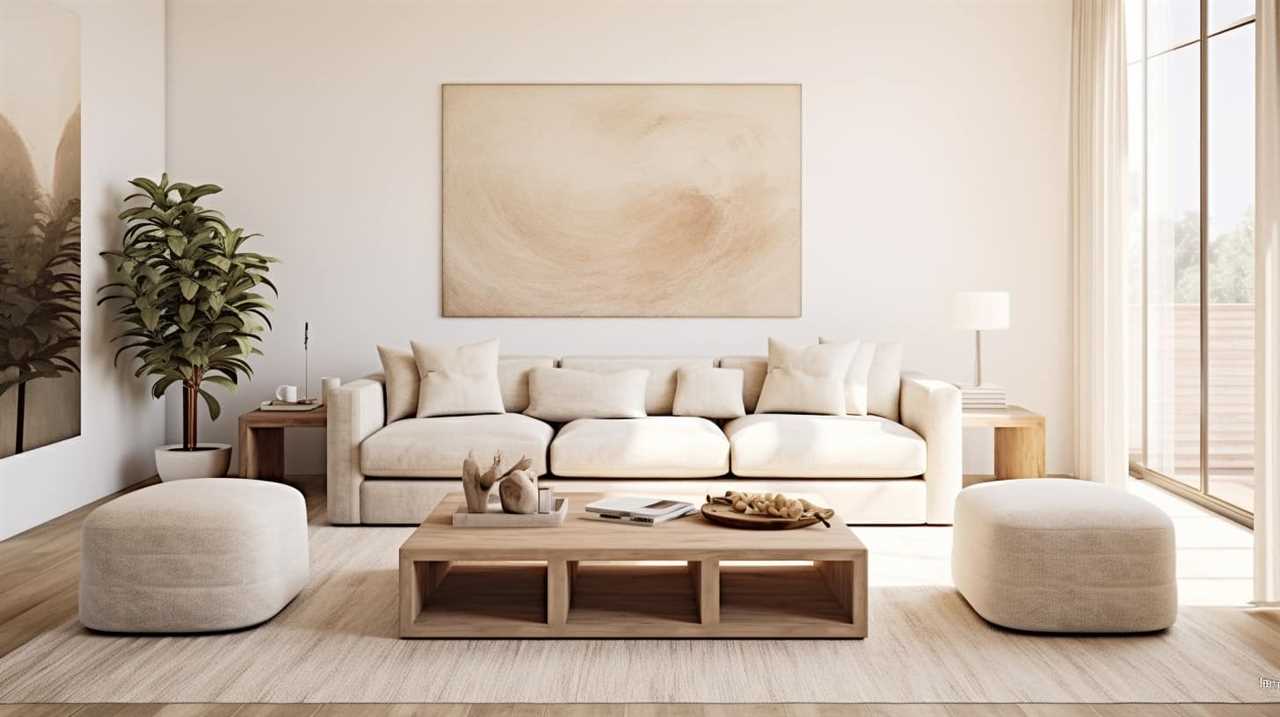
-
Create a flexible menu: Plan your meals around versatile ingredients that can be used in multiple dishes. This way, you can interchange ingredients and create new meals without having to buy additional groceries.
Letting Go of Excess
As we embark on our minimalist journey, we must learn to let go of excess in order to create a more meaningful and intentional life. Letting go of attachments is a fundamental aspect of the minimalism mindset.
We live in a society that encourages us to accumulate possessions, often equating them with success and happiness. However, minimalism challenges this notion by focusing on what truly adds value to our lives. By letting go of excess, we free ourselves from the burden of material possessions and create space for what truly matters.
This process can be both liberating and empowering, allowing us to prioritize experiences and relationships over material possessions. It requires us to evaluate our belongings and let go of items that no longer serve a purpose or bring us joy.

Letting go of excess isn’t only about decluttering our physical space but also about decluttering our minds and hearts. It’s about simplifying our lives and making intentional choices that align with our values and goals.
Creating a Minimalist Wardrobe
Let’s start by curating our wardrobe to include only essential and versatile pieces that will enhance our minimalist lifestyle. Creating a capsule wardrobe is a key step in simplifying our lives and embracing sustainable fashion.
Here are three items to consider incorporating into our minimalist wardrobe:
-
Classic essentials: Invest in timeless pieces like a well-fitted white shirt, a tailored blazer, and a pair of high-quality jeans. These items can be mixed and matched to create endless outfit options.

-
Neutral color palette: Opt for a wardrobe predominantly consisting of neutral colors such as black, white, gray, and beige. This allows for easy coordination and versatility in styling.
-
Quality over quantity: Instead of filling our closet with cheap and trendy items, focus on investing in high-quality pieces that will last longer. Choose sustainable and ethically made clothing to make a positive impact on both the environment and the lives of those who produce them.
Designing a Minimalist Home
Occasionally, it can be challenging to create a minimalist home, but with careful planning and intentional choices, we can achieve a clutter-free and serene living space. Designing a minimalist home involves creating a space that is both functional and aesthetically pleasing. To help you get started, here is a simple table showcasing three key elements of minimalist interior design and decor:
| Element | Description | Benefits |
|---|---|---|
| Neutral Colors | Opt for a color palette of whites, grays, and earth tones. | Creates a calm and peaceful atmosphere. |
| Clean Lines | Choose furniture and accessories with sleek and simple designs. | Adds a sense of elegance and sophistication. |
| Decluttered Spaces | Keep surfaces clear and only display essential items. | Reduces visual distractions and promotes a sense of tranquility. |
Living With Intention and Purpose
By prioritizing our values and making deliberate choices, we can live with intention and purpose, enhancing our overall quality of life. Living intentionally means being mindful of our actions and decisions, aligning them with our core values and long-term goals. It involves being present in the moment and making conscious choices that bring us closer to our desired outcomes.

Finding purpose, on the other hand, requires introspection and reflection. It involves exploring our passions, values, and strengths to discover what truly fulfills us.
Here are three ways to live with intention and purpose:
-
Set clear goals: Define what you want to achieve in different areas of your life and create a roadmap to reach those goals.
-
Practice gratitude: Cultivate a mindset of gratitude by acknowledging and appreciating the blessings in your life, which can help you stay focused on what truly matters.
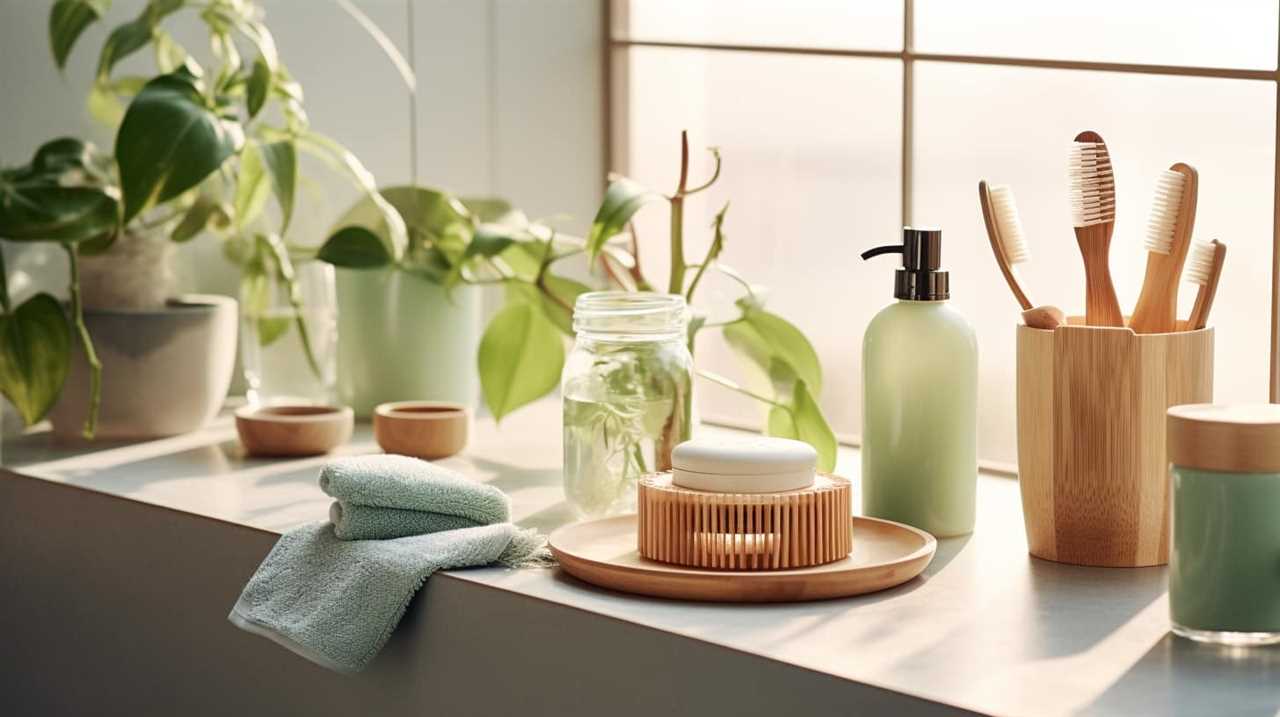
-
Simplify your life: Eliminate the unnecessary and declutter your physical and mental space, allowing you to focus on what brings you joy and fulfillment.
Frequently Asked Questions
How Can Minimalist Living Improve Your Mental and Emotional Well-Being?
Improving relationships and enhancing creativity are just a few ways minimalist living can improve our mental and emotional well-being. Simplifying our lives leads to less stress and more focus on what truly matters.
What Are Some Practical Tips for Maintaining a Minimalist Lifestyle When Living With a Family or Roommates?
Here are some practical tips for maintaining a minimalist lifestyle in a shared living space. Communicate the benefits of minimalism to your family or roommates, and work together to implement these tips for a more organized and peaceful home.
How Can Minimalist Living Help to Reduce Stress and Increase Productivity?
Reduced clutter and improved focus are just a few ways minimalist living can help us reduce stress and increase productivity. By simplifying our surroundings, we create a space that allows us to thrive.

Can Minimalist Living Have a Positive Impact on Your Financial Situation?
Minimalist living can positively impact our financial situation by encouraging us to prioritize needs over wants, reduce unnecessary spending, and save money. It allows us to focus on what truly matters and achieve long-term financial stability.
Are There Any Potential Challenges or Drawbacks to Adopting a Minimalist Lifestyle?
There can be potential challenges and drawbacks to adopting a minimalist lifestyle, such as letting go of sentimental belongings. However, the benefits of simplicity, sustainability, and improved well-being outweigh these challenges. Here are some tips and tricks to navigate minimalist living.
Conclusion
In conclusion, embracing minimalist living is like unlocking the secret to an extraordinary life. By simplifying our physical space, decluttering our minds, and prioritizing experiences over possessions, we can truly enhance our existence.
It’s a journey of gratitude, contentment, and intentional living that will leave you feeling lighter, freer, and more fulfilled than ever before.
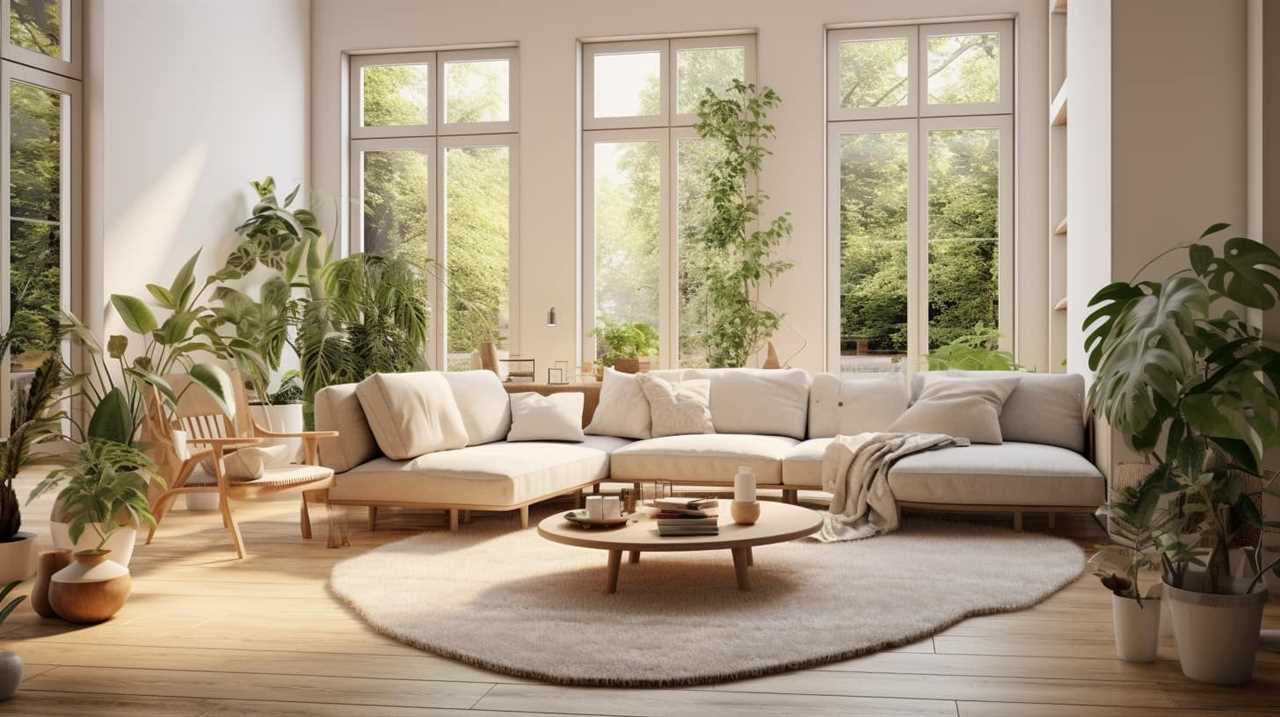
So, why settle for a life weighed down by excess when you can embrace the minimalist lifestyle and experience the true joy of living?
I’m Theodore, and I love tiny houses. In fact, I’m the author of Tiny House 43, a book about tiny houses that are also tree houses. I think they’re magical places where imaginations can run wild and adventures are just waiting to happen.
While tree houses are often associated with childhood, they can be the perfect adult retreat. They offer a cozy space to relax and unwind, surrounded by nature. And since they’re typically built on stilts or raised platforms, they offer stunning views that traditional homes simply can’t match.
If you’re looking for a unique and romantic getaway, a tree house tiny house might just be the perfect option.
Minimalism
Top 10 Most Significant Minimalist Living Concepts for Personal Growth

We have all felt the burden of having too much in our lives, whether it be physical clutter or the never-ending busyness that makes us feel stressed out.
But what if there was a way to lighten our load and find greater fulfillment?
In this article, we explore the top 10 most significant minimalist living concepts for personal growth.
By embracing a minimalist mindset, streamlining our routines, and creating space for what truly matters, we can unlock a path to a more intentional and purposeful life.

Key Takeaways
- Minimalism creates a sense of calm and clarity in our environment.
- Embracing minimalism leads to increased focus and clarity.
- Minimalism provides financial freedom and more time for meaningful pursuits.
- Streamlining daily routines through minimalism reduces stress and increases productivity.
The Power of Decluttering
We can experience the transformative power of decluttering in our lives. Embracing minimalism and decluttering our physical space has numerous benefits that extend beyond just tidying up our surroundings.
When we declutter, we create a sense of calm and clarity in our environment, allowing us to focus on what truly matters. By letting go of excess possessions, we free up mental and emotional energy, enabling us to make room for personal growth and self-discovery.
Minimalism teaches us to prioritize experiences and relationships over material possessions, leading to a more fulfilling and purposeful life. Decluttering also helps us to become more organized and efficient, reducing stress and increasing productivity.
Ultimately, the power of minimalism and decluttering lies in its ability to simplify our lives, allowing us to live with intention and serve others in a more meaningful way.
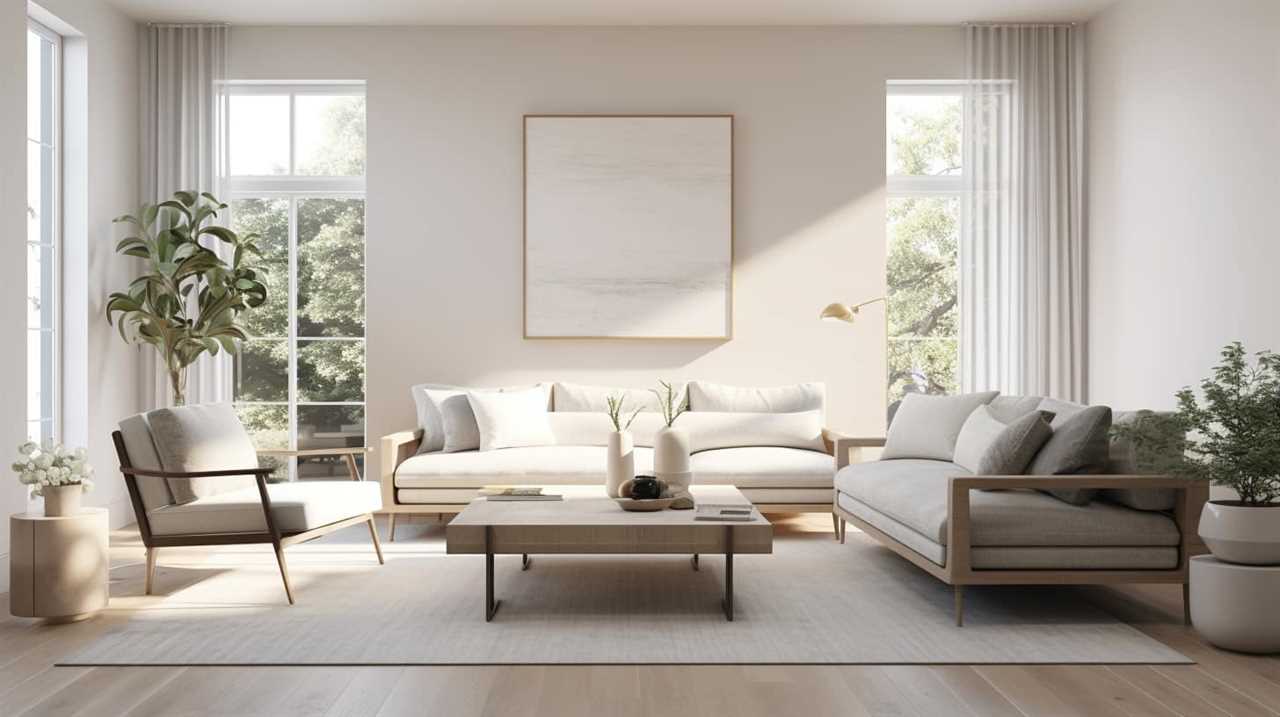
Embracing Minimalist Mindset
When it comes to embracing a minimalist mindset, there are numerous benefits to be gained. By simplifying our lives and focusing on what truly matters, we can experience increased clarity, reduced stress, and a greater sense of contentment.
To help achieve this, there are practical minimalist tips that can be implemented. These include decluttering our physical spaces, practicing mindfulness, and being intentional with our consumption habits.
Benefits of Minimalism
Although it may seem counterintuitive, embracing a minimalist mindset can bring about numerous benefits for personal growth. By simplifying our lives and letting go of excess, we create space for what truly matters. Here are some advantages of adopting a minimalist lifestyle:
| Benefits | Advantages |
|---|---|
| Reduced stress | Increased focus and clarity |
| Enhanced creativity | Improved decision-making |
| Financial freedom | More time for meaningful pursuits |
When we minimize distractions and eliminate the unnecessary, we experience a sense of calm and clarity, allowing us to focus on what truly brings us joy and fulfillment. This newfound mental space also fuels our creativity, enabling us to think outside the box and find innovative solutions. Moreover, embracing minimalism can lead to financial freedom as we learn to prioritize our spending and avoid unnecessary material possessions. Ultimately, these benefits of minimalism contribute to personal growth and a more fulfilling life.

Now, let’s move on to practical minimalist tips to help you incorporate this mindset into your everyday life.
Practical Minimalist Tips
Practically, incorporating a minimalist mindset into our everyday lives can lead to significant personal growth.
One practical way to embrace this mindset is through practical organization. By decluttering our living spaces and organizing our belongings, we can create a sense of calm and clarity in our surroundings. This not only reduces stress, but also allows us to focus on what truly matters.
Another aspect of practicing minimalism is adopting minimalist decor. This involves choosing simple and functional pieces that serve a purpose, rather than accumulating unnecessary items. Minimalist decor promotes a sense of tranquility and fosters a peaceful environment.
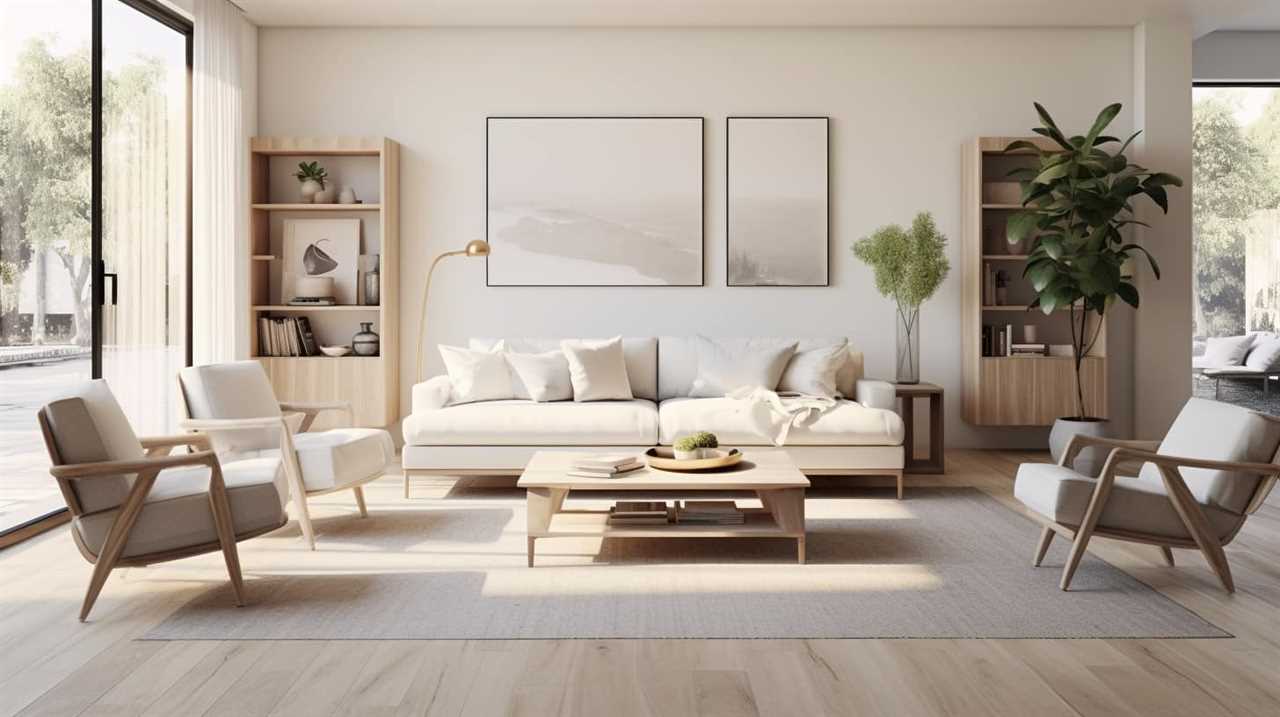
Streamlining Daily Routines
When it comes to streamlining our daily routines, there are a few key points to keep in mind.
First, simplifying our morning ritual can help us start the day on a calm and focused note. This could mean prepping breakfast and outfits the night before, or establishing a consistent morning routine that minimizes decision-making.
Second, decluttering our evening routine can create a sense of calm and relaxation before bed. This might involve tidying up, putting away any lingering tasks or distractions, and setting a peaceful atmosphere for sleep.
Lastly, efficient mealtime organization can save time and reduce stress. This could mean planning meals ahead, batch cooking, or implementing time-saving strategies like meal prepping or using convenient kitchen gadgets.
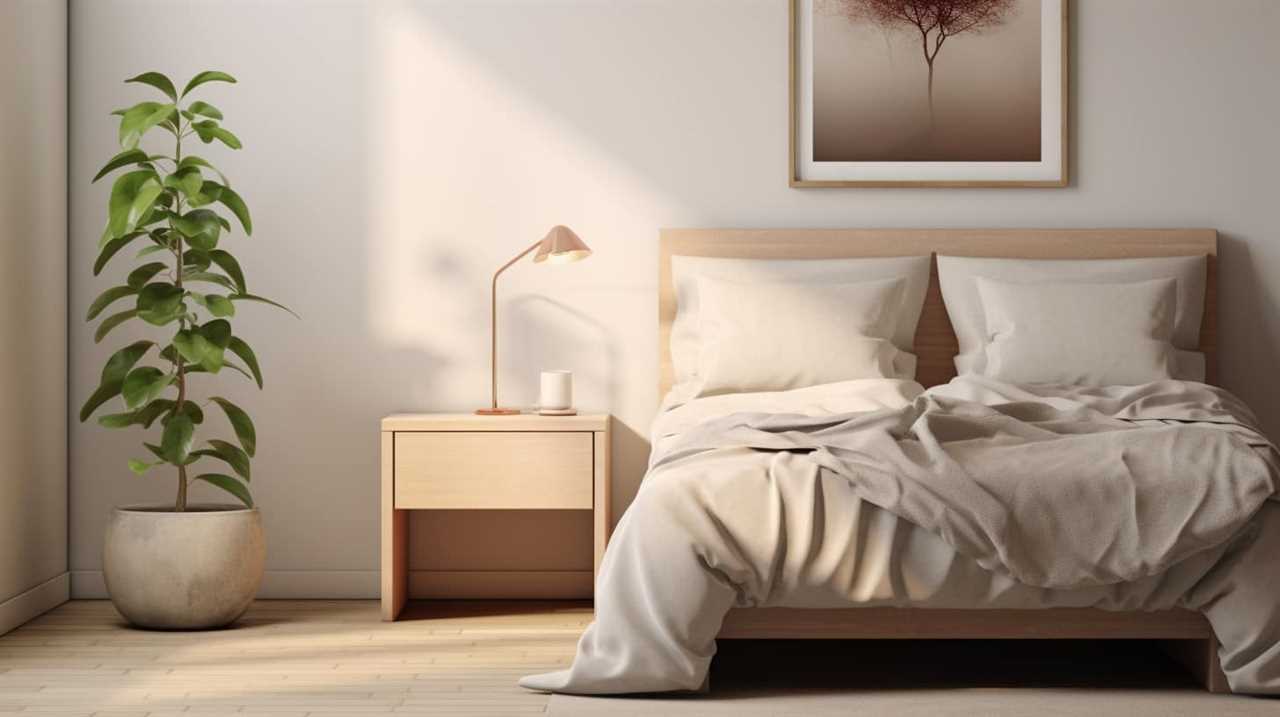
Simplify Morning Ritual
We should aim to simplify our morning ritual in order to streamline our daily routines and increase efficiency.
One way to do this is by adopting a minimalist wardrobe. By decluttering our closets and keeping only the essential clothing items, we can save time and energy when getting dressed in the morning.
Having a limited number of options makes it easier to choose an outfit and reduces decision fatigue.
Another way to simplify our morning routine is by creating an efficient workspace. Organizing our desk and keeping it clutter-free allows us to start our day with a clear mind and focus on the tasks at hand.

By streamlining our morning rituals through a minimalist wardrobe and an efficient workspace, we can set the tone for a productive and stress-free day.
Now, let’s move on to the next section and discuss how to declutter our evening routine.
Declutter Evening Routine
Let’s begin by incorporating a simple pre-bedtime routine to declutter our evening and streamline our daily routines. By implementing an organized evening routine, we can create a calm and peaceful environment, allowing for relaxation and rejuvenation before sleep. Here are some ideas to help declutter our evening and promote a sense of serenity:
- Set a specific time to wind down and start preparing for bed.
- Create a checklist of tasks to complete before bedtime, such as tidying up the living space, putting away any items that are out of place, and organizing our workspace.
- Limit screen time before bed to promote better sleep.
- Practice relaxation techniques, such as deep breathing or meditation, to calm the mind and release stress.
- Prepare for the next day by laying out clothes and organizing any items needed for the morning routine.
Efficient Mealtime Organization
Two key strategies to streamline our daily routines and promote efficient mealtime organization are planning ahead and utilizing time-saving techniques.

Meal planning is an essential aspect of efficient mealtime organization. By taking the time to plan our meals in advance, we can save valuable time and reduce stress during the week. Creating a weekly meal plan allows us to make a comprehensive grocery list and ensures that we’ve all the necessary ingredients on hand. This eliminates the need for last-minute trips to the grocery store and prevents unnecessary food waste.
Additionally, kitchen organization plays a vital role in efficient mealtime organization. By keeping our kitchen well-organized, we can easily locate ingredients and cooking utensils, saving us time and effort. Utilizing storage containers, labeling shelves, and organizing our pantry are all effective ways to maintain a streamlined and efficient kitchen.
With these strategies in place, we can enjoy seamless meal preparation and more time for other activities.
Creating Space for What Matters
Our first step in creating space for what matters is decluttering our physical environment. By simplifying our surroundings, we can create a calm and peaceful atmosphere that allows us to focus on the things that truly bring us joy and fulfillment.

Here are some minimalist home decor ideas to help us create space for relationships and what matters most:
- Embrace a neutral color palette: Opt for light and soothing colors that promote relaxation and serenity.
- Use multi-functional furniture: Choose pieces that serve multiple purposes, such as a storage ottoman or a coffee table with built-in shelves.
- Minimize decorative items: Keep only the ones that hold sentimental value or evoke positive emotions.
- Clear out digital clutter: Organize your digital files and delete unnecessary apps and emails.
- Create designated spaces: Designate specific areas for activities like reading, meditation, or spending quality time with loved ones.
Mindful Consumption Habits
When it comes to mindful consumption habits, there are three key points to consider.
First, conscious spending choices allow us to prioritize what truly matters and avoid unnecessary purchases.
Second, simplifying our material possessions helps us declutter our lives and create space for what brings us joy.
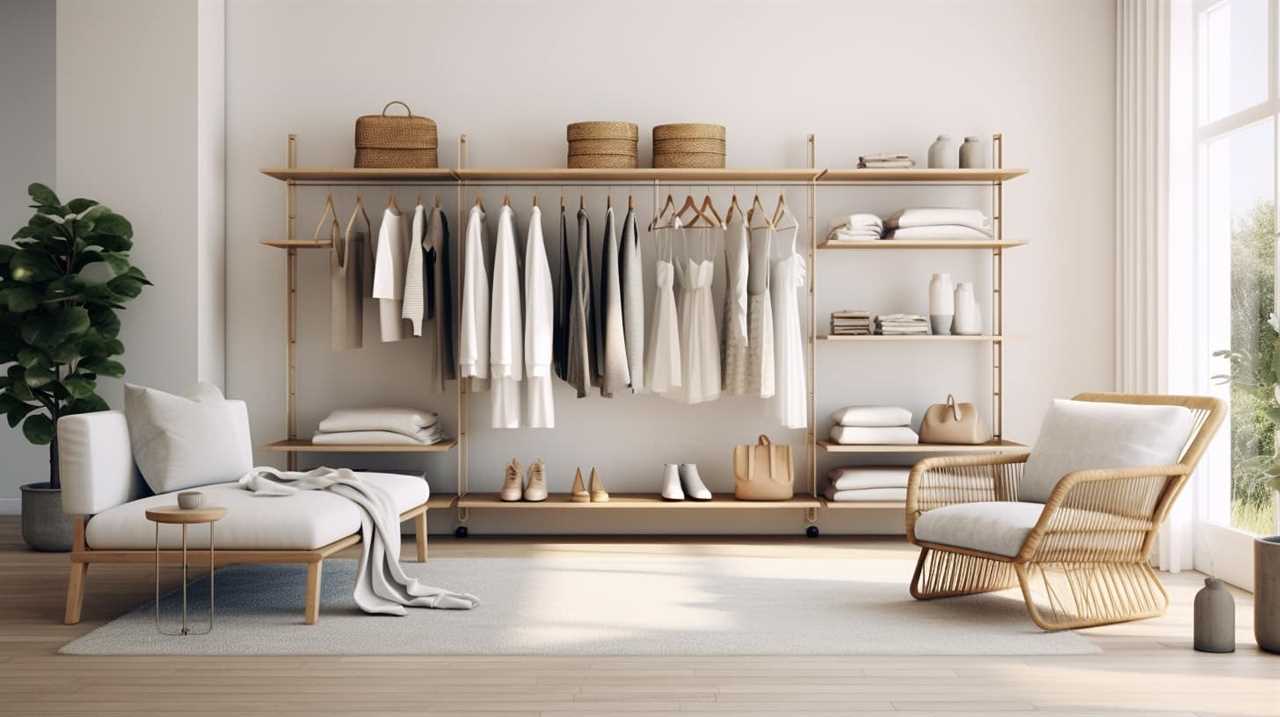
Finally, embracing a sustainable lifestyle means making choices that align with our values and have a positive impact on the environment.
Conscious Spending Choices
Let’s explore the benefits of adopting a mindful approach to our spending choices. Making conscious spending choices is an important aspect of minimalist living that can lead to financial freedom and personal growth.
Here are five key benefits of practicing mindful consumption habits:
-
Increased awareness: By being mindful of our shopping choices, we become more aware of our needs versus wants, helping us make more intentional purchases.
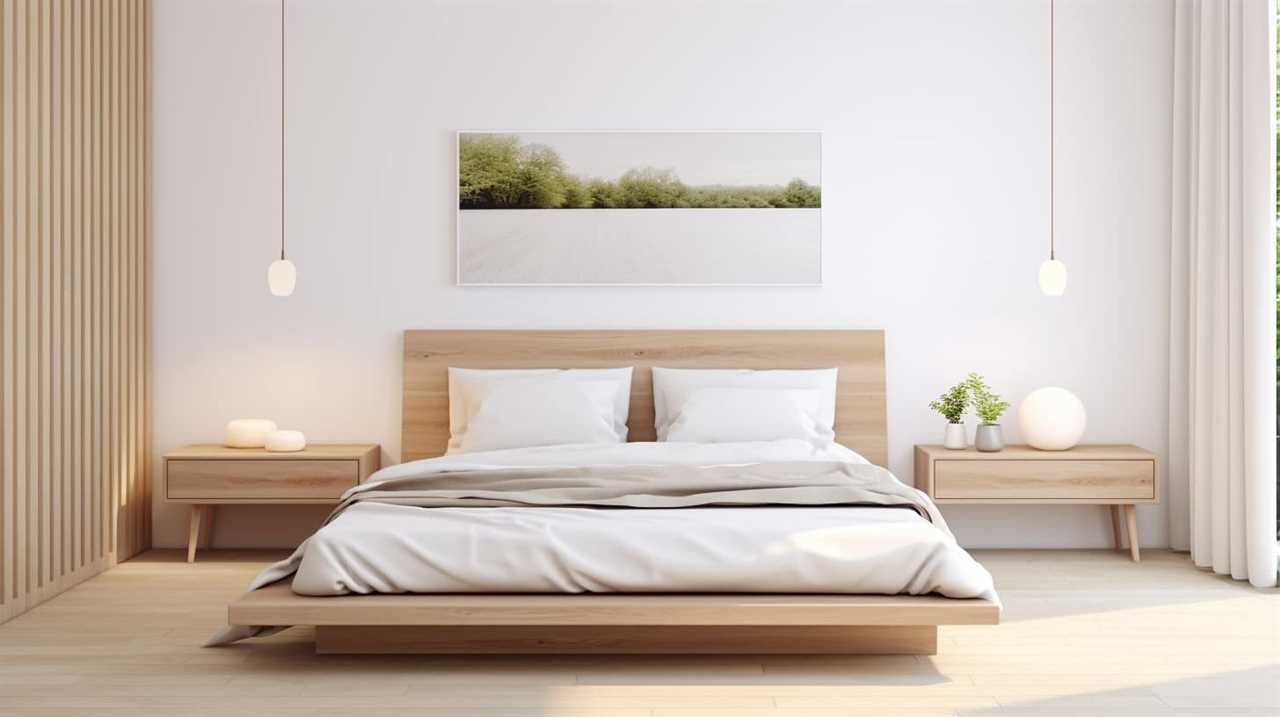
-
Reduced clutter: Mindful shopping choices prevent us from accumulating unnecessary items, reducing clutter and creating a more organized living space.
-
Financial freedom: By being conscious of our spending, we can save money and avoid falling into debt, ultimately achieving financial freedom.
-
Environmental impact: Mindful consumption habits involve considering the environmental impact of our purchases, promoting sustainability and reducing waste.
-
Improved well-being: By focusing on what truly brings us joy and value, we can enhance our overall well-being and find contentment in a simpler, more purposeful lifestyle.

Simplifying Material Possessions
One way we can simplify our material possessions is by decluttering and consciously choosing to consume only what’s necessary and meaningful. By adopting a minimalist mindset, we can create a more intentional and fulfilling life.
This includes incorporating minimalist fashion and minimalist home design into our daily lives.
In terms of minimalist fashion, it’s about owning fewer but high-quality clothing items that can be mixed and matched easily. This not only saves money but also reduces decision fatigue and simplifies our daily routine. By curating a wardrobe that consists of timeless pieces, we can focus on what truly matters in life.
Similarly, minimalist home design emphasizes simplicity, functionality, and decluttering. It involves removing unnecessary items and creating a clean and organized living space. This minimalist approach can help create a calming and peaceful environment, allowing us to focus on the things that bring us joy and fulfillment.
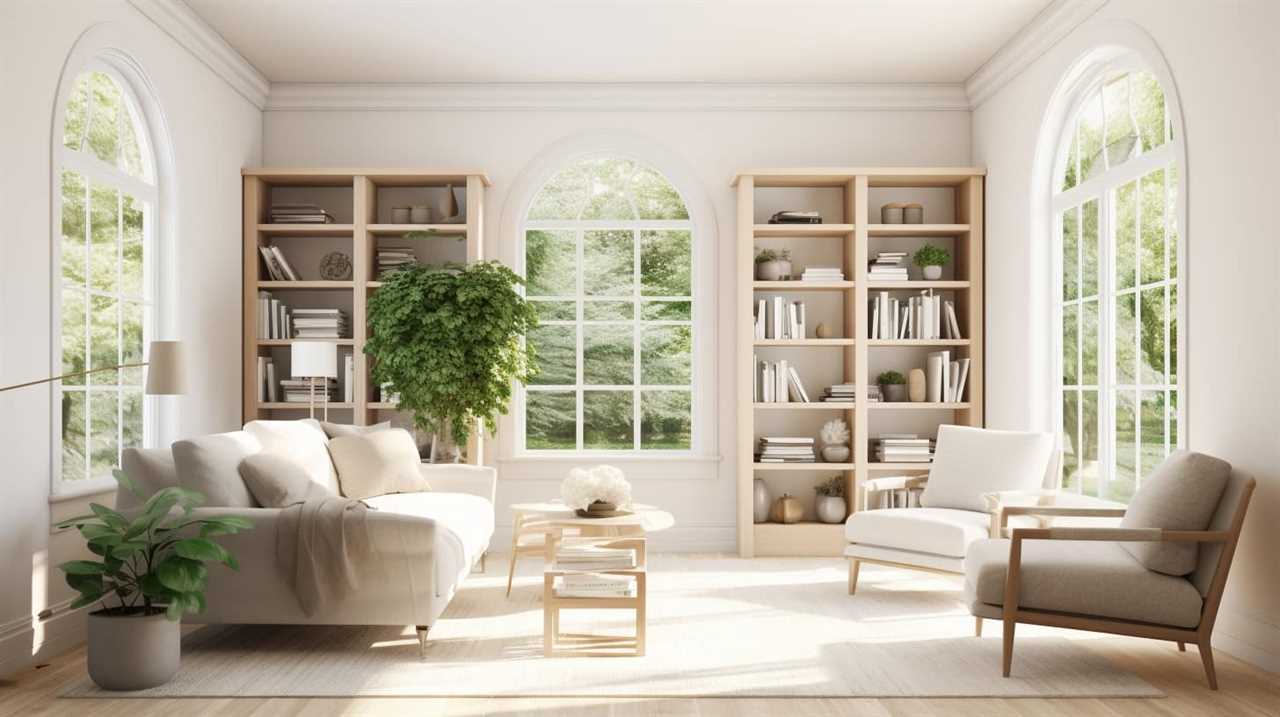
Embracing Sustainable Lifestyle
We can make a significant impact on the environment by adopting sustainable lifestyle choices and practicing mindful consumption habits. Here are some ideas to help you embrace a sustainable lifestyle:
-
Choose sustainable fashion: Opt for clothing made from eco-friendly materials such as organic cotton or recycled fabrics. Support ethical fashion brands that prioritize fair wages and safe working conditions.
-
Create an eco-friendly home: Use energy-efficient appliances, install solar panels, and insulate your home to reduce energy consumption. Choose eco-friendly cleaning products and reduce waste by composting and recycling.
-
Reduce single-use items: Say no to plastic bags, straws, and water bottles. Invest in reusable alternatives like stainless steel water bottles and cloth bags.

-
Eat sustainably: Incorporate more plant-based meals into your diet, as animal agriculture has a significant impact on the environment. Support local farmers and choose organic, locally sourced produce whenever possible.
-
Practice mindful consumption: Before making a purchase, consider if you truly need the item. Buy second-hand or borrow when possible, and repair or repurpose items instead of throwing them away.
Simplifying Digital Life
How can we streamline our digital lives to enhance personal growth?
In today’s fast-paced world, our digital devices can often become overwhelming, causing us to lose focus and become distracted from our personal goals.

To simplify our digital lives, it’s important to embrace the concept of a digital detox. This involves taking regular breaks from technology to recharge and refocus our attention on what truly matters.
Additionally, minimizing distractions is key to staying focused and productive. This can be achieved by decluttering our digital devices, organizing our files and apps, and setting boundaries for our screen time.
Cultivating Gratitude and Contentment
Let’s explore the transformative power of cultivating gratitude and contentment in our minimalist journey. Incorporating practices of gratitude into our daily lives allows us to shift our focus from what we lack to what we already have, fostering a sense of abundance and fulfillment.
Here are five gratitude practices that can help us find contentment:

-
Keep a gratitude journal: Take a few minutes each day to write down three things you’re grateful for. This simple practice can help shift your mindset and increase feelings of happiness and contentment.
-
Practice mindfulness: Being present in the moment allows us to fully appreciate and be grateful for the simple joys in life.
-
Express gratitude to others: Show appreciation for the people in your life by expressing gratitude through kind words, acts of service, or small gestures.
-
Find gratitude in challenges: Even during difficult times, there’s always something to be grateful for. Look for the lessons and silver linings in challenging situations.

-
Practice self-compassion: Be kind and compassionate towards yourself, acknowledging and appreciating your own strengths and achievements.
Prioritizing Experiences Over Possessions
As we embark on our minimalist journey, it’s important to prioritize experiences over possessions in order to cultivate a more fulfilling and meaningful life. Experiential living allows us to focus on creating memories and building relationships rather than accumulating material things.
By embracing minimalistic travel, we can explore new places, immerse ourselves in different cultures, and broaden our perspectives. Traveling light not only simplifies our lives but also frees us from the burden of excessive belongings. It allows us to fully enjoy the present moment and appreciate the beauty of the world around us.
By prioritizing experiences, we shift our focus towards personal growth and self-discovery, creating a life filled with joy, adventure, and fulfillment.

Now, let’s transition into the next section and explore the importance of practicing minimalist self-care.
Practicing Minimalist Self-Care
We can prioritize our well-being and simplify our self-care routines by incorporating minimalist practices into our daily lives. By embracing a minimalist mindset, we can focus on what truly matters and create more meaningful self-care experiences.
Here are some minimalist self-care practices that can lead to self-reflection and self-improvement:
-
Simplify your self-care products: Streamline your skincare and beauty routine by using fewer products that are essential and bring you joy.
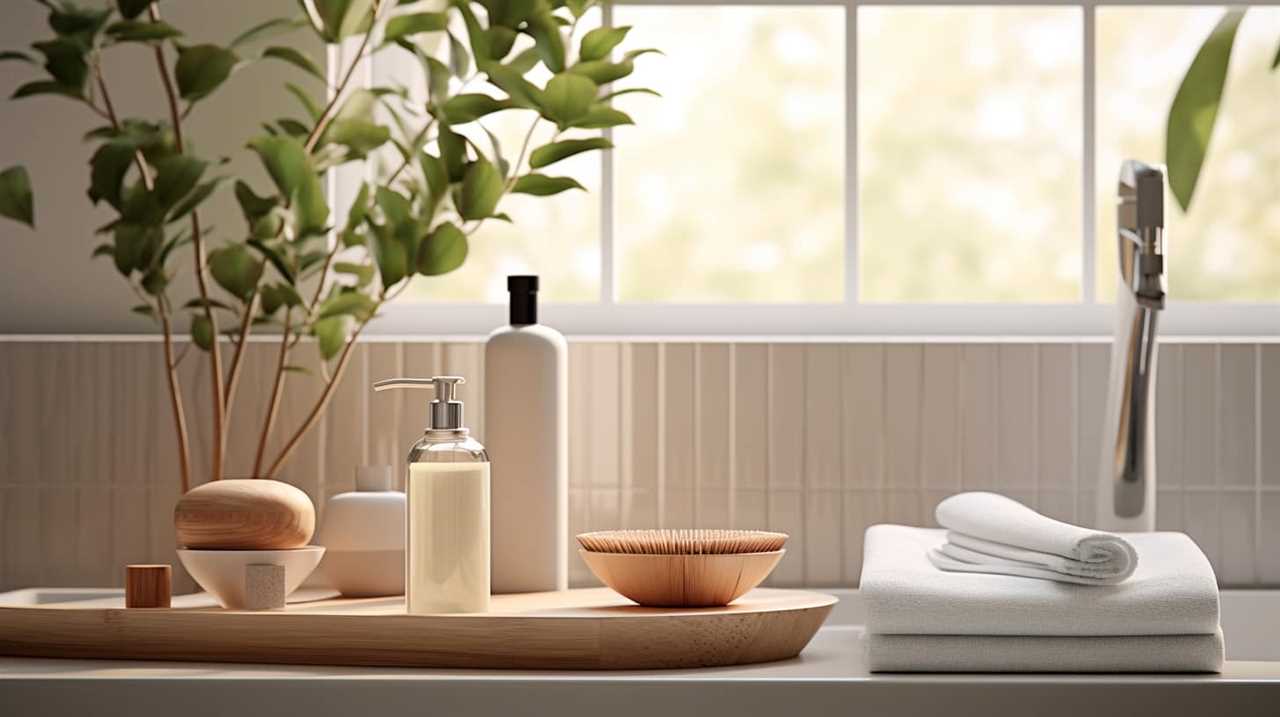
-
Declutter your self-care space: Create a calm and clutter-free environment by organizing your self-care space and keeping only the items that you truly need.
-
Practice mindfulness: Incorporate mindfulness into your self-care routine by taking time to be present, meditate, or engage in mindful activities such as journaling or deep breathing exercises.
-
Embrace self-reflection: Take moments of solitude and self-reflection to understand your needs, desires, and goals, allowing for personal growth and self-improvement.
-
Prioritize self-care experiences: Instead of focusing on material possessions, prioritize experiences that nourish your soul and contribute to your overall well-being.
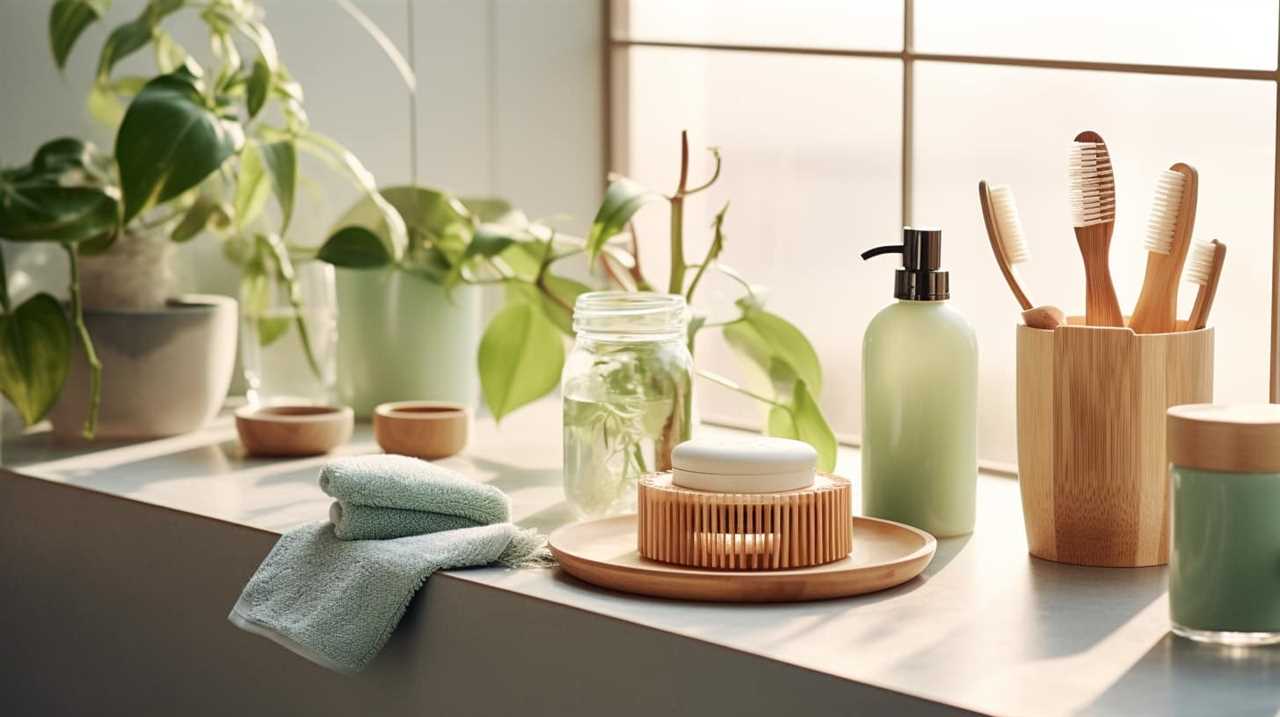
Building a Supportive Minimalist Community
How can we connect with others and foster a sense of community while embracing minimalist principles?
Building minimalist relationships and engaging in minimalist community events can be great ways to achieve this. By seeking out like-minded individuals who also value simplicity and intentional living, we can create a supportive network that encourages personal growth and fulfillment.
Minimalist relationships are built on shared values and common goals, allowing us to support and inspire each other on our journey towards a more intentional life.
Attending minimalist community events, such as workshops, meetups, or retreats, provides opportunities to connect with others who are also seeking a simpler lifestyle. These events often provide a space for learning, sharing experiences, and collaborating on projects that promote minimalism.

Together, we can create a supportive minimalist community that empowers and uplifts each other.
Frequently Asked Questions
How Can I Effectively Declutter My Space Without Feeling Overwhelmed?
We’ve found practical decluttering techniques and organizing tips that can help us effectively declutter our space without feeling overwhelmed. Let’s explore these strategies to create a more organized and peaceful living environment.
What Are Some Practical Ways to Embrace a Minimalist Mindset in a Consumer-Driven Society?
In a consumer-driven society, we can embrace a minimalist mindset by practicing mindful purchasing and sustainable living. By making intentional buying decisions and minimizing our environmental impact, we can find personal growth in living with less.
How Can I Streamline My Daily Routines to Save Time and Reduce Stress?
To streamline our morning routine and reduce stress, we prioritize time management. By setting clear goals, creating a schedule, and eliminating unnecessary tasks, we can make the most of our time and focus on serving others.

What Are Some Creative Ways to Create Physical and Mental Space for What Truly Matters in My Life?
To find balance and prioritize meaningful connections in a busy world, we explore creative ways to create physical and mental space for what truly matters. It’s about streamlining our lives and nurturing what brings us joy.
How Can I Practice Mindful Consumption Habits in a Society That Encourages Excessive Buying and Consumption?
To practice mindful consumption in a society that promotes excessive buying, we can make intentional purchases by asking ourselves if we truly need an item and considering its impact on the environment and our well-being. Resisting societal pressure to constantly upgrade and acquire new things is key.
Conclusion
In conclusion, embracing minimalist living concepts can truly transform our lives. By decluttering our physical spaces, streamlining our routines, and practicing mindful consumption, we create room for what truly matters.
We learn to prioritize experiences over possessions and cultivate gratitude and contentment. Minimalist self-care becomes a priority, and we build a supportive community around us.
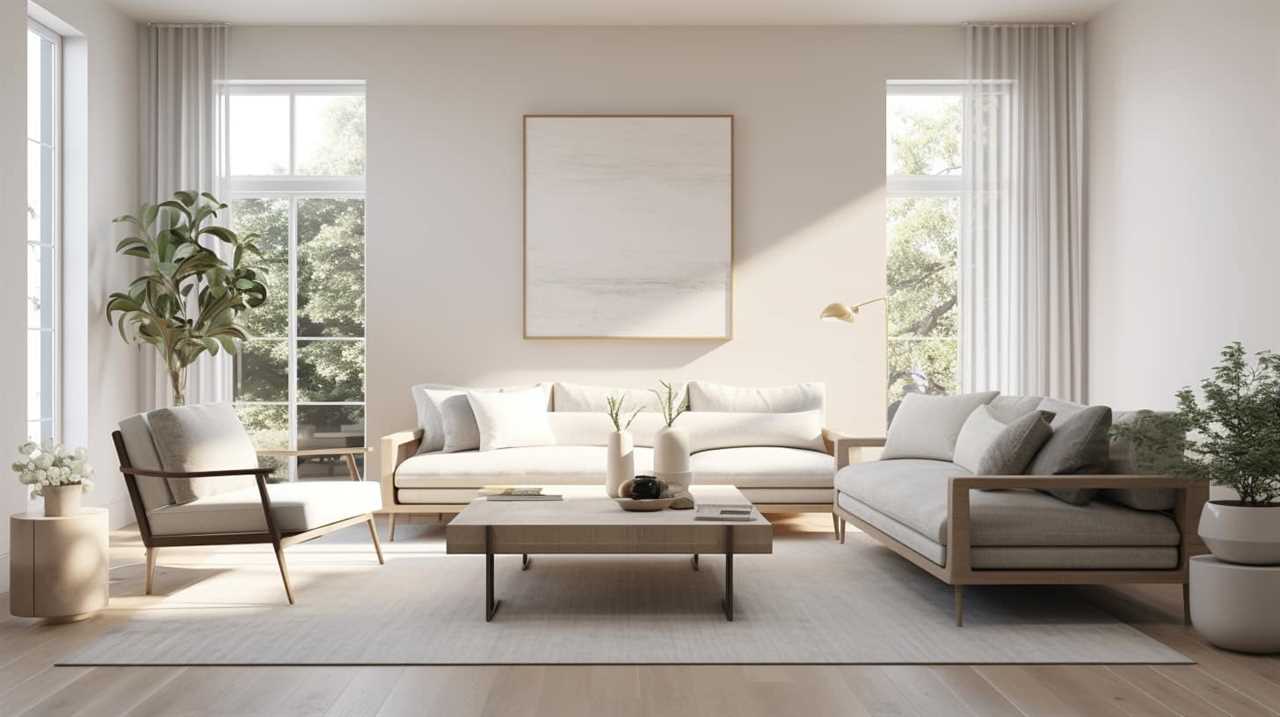
So let’s bid farewell to the excess and embrace the art of living with less, because sometimes, less truly is more.
I’m Theodore, and I love tiny houses. In fact, I’m the author of Tiny House 43, a book about tiny houses that are also tree houses. I think they’re magical places where imaginations can run wild and adventures are just waiting to happen.
While tree houses are often associated with childhood, they can be the perfect adult retreat. They offer a cozy space to relax and unwind, surrounded by nature. And since they’re typically built on stilts or raised platforms, they offer stunning views that traditional homes simply can’t match.
If you’re looking for a unique and romantic getaway, a tree house tiny house might just be the perfect option.
Minimalism
Top 10 Best Techniques for a Minimalist and Eco-friendly Lifestyle

Are you prepared to have a positive influence on the environment and streamline your life? We have you covered with our top 10 best methods for adopting a minimalist and eco-friendly lifestyle.
Did you know that embracing minimalism can reduce stress levels by 40%? By simplifying our living spaces, wardrobes, and daily routines, we can create a more sustainable and fulfilling life.
Join us as we explore practical tips to incorporate eco-friendly practices, support local businesses, and cultivate mindfulness in our everyday lives.
Let’s make a difference together!
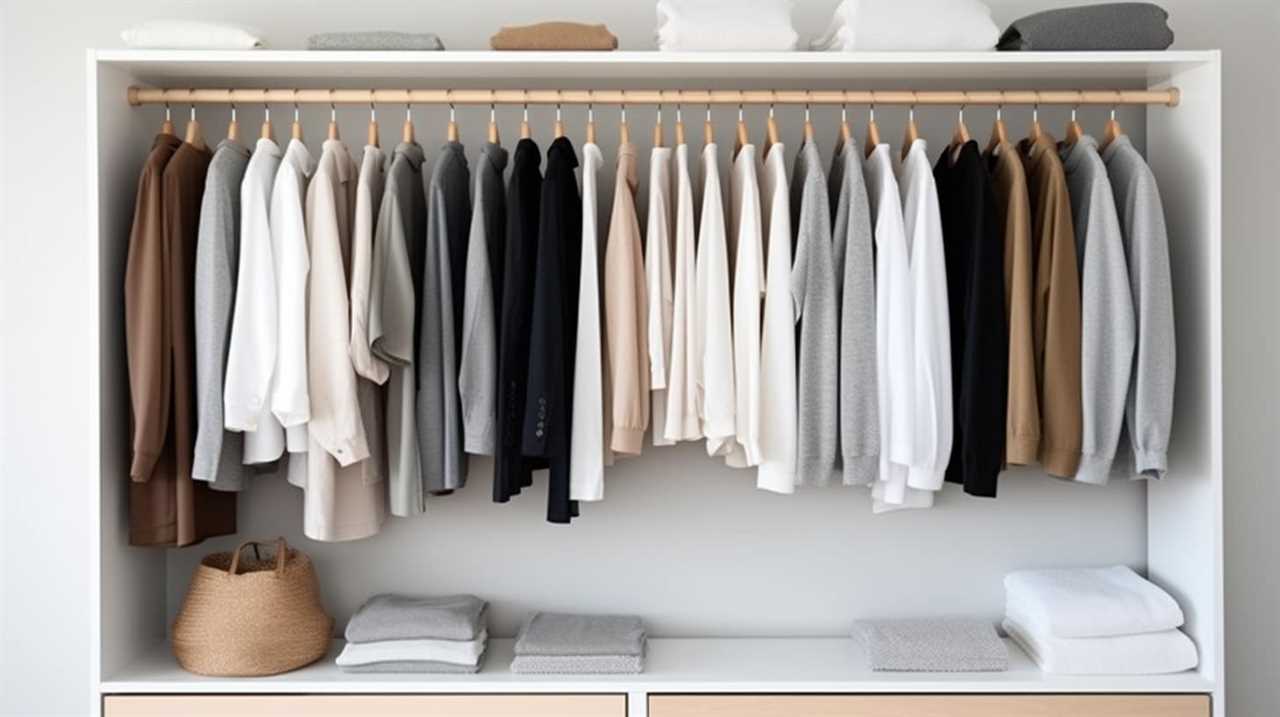
Key Takeaways
- Embrace minimalism in your living space and wardrobe through decluttering, minimalist decor, and a capsule wardrobe
- Adopt a zero-waste lifestyle by using sustainable and reusable alternatives, practicing zero waste grocery shopping, and composting organic waste at home
- Utilize sustainable transportation options and incorporate eco-friendly practices in daily routines
- Choose sustainable and ethically sourced food options and support local businesses while conserving energy in your home
Simplifying Your Living Space
We can start simplifying our living space by decluttering our belongings. Simplifying our living space isn’t only aesthetically pleasing, but it also helps create a calm and peaceful environment.
One way to achieve this is by incorporating minimalist decor into our homes. Minimalist decor focuses on clean lines, simplicity, and functionality. By choosing furniture and accessories that serve a purpose and eliminate excess, we can create a more organized and efficient living space.
Another effective technique for simplifying our living space is by implementing organizing techniques. This can include using storage containers, labeling items, and creating designated spaces for different belongings.
Embracing Minimalism in Your Wardrobe
When it comes to embracing minimalism in your wardrobe, there are a few key points to consider.

First, a capsule wardrobe offers numerous benefits, such as saving time and money, and reducing decision fatigue.
Second, making sustainable fashion choices is essential for minimizing the environmental impact of our clothing.
Capsule Wardrobe Benefits
With a capsule wardrobe, we can simplify our clothing choices and reduce our environmental impact by embracing a minimalist approach to our wardrobes. Here are the benefits of adopting a capsule wardrobe:
-
Versatility: A capsule wardrobe consists of a limited number of essential and versatile pieces that can be mixed and matched to create multiple outfits. This allows for endless outfit possibilities without the need for a large wardrobe.
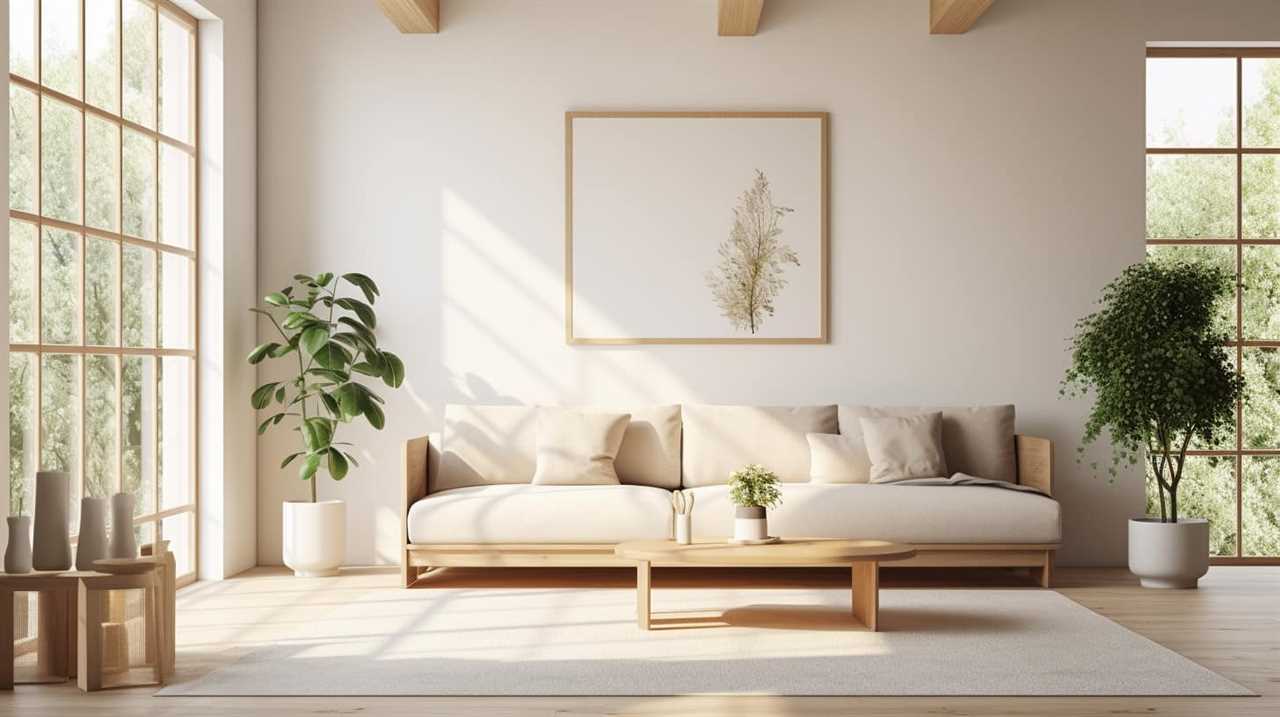
-
Time and money savings: By investing in high-quality, versatile pieces that can be worn in different ways, we eliminate the need for constant shopping and impulse purchases. This saves both time and money in the long run.
-
Reduced environmental impact: By owning fewer clothes and buying less, we contribute to reducing the demand for fast fashion and its negative impact on the environment. A capsule wardrobe promotes mindful consumption and sustainability.
Embracing a capsule wardrobe brings numerous benefits, including versatility, time and money savings, and a reduced environmental impact. It’s a practical and sustainable approach to dressing that can simplify our lives while still allowing us to express our personal style.
Sustainable Fashion Choices
By choosing sustainable fashion options and embracing minimalism in our wardrobes, we can actively contribute to a more eco-friendly and conscious lifestyle. Sustainable fashion choices aren’t only better for the environment, but they also promote ethical practices and support fair trade.
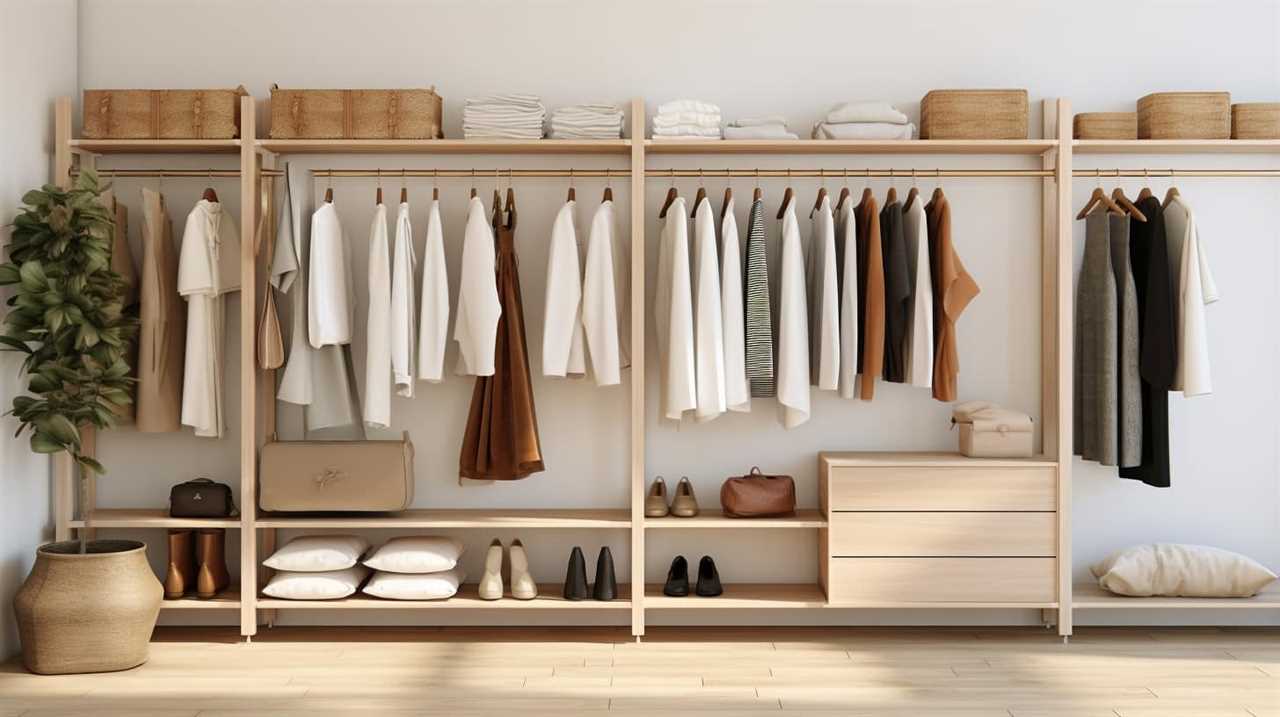
When building an eco-friendly wardrobe, it’s important to consider the materials used in clothing production. Opt for natural fibers like organic cotton, hemp, and bamboo, which are renewable and biodegradable. Look for clothing brands that prioritize sustainability and transparency in their supply chain.
Additionally, embracing minimalism in our wardrobes means buying fewer items and focusing on versatile pieces that can be mixed and matched. This reduces waste and promotes a more sustainable approach to fashion.
Decluttering for Minimalist Wardrobe
We often find that decluttering our wardrobes is a key step in embracing a minimalist lifestyle. Not only does it help us create a more organized space, but it also allows us to focus on the items that truly bring us joy and reflect our personal style.
When it comes to minimalist organization, here are three tips to help you declutter your wardrobe and embrace a more sustainable fashion trend:

-
Assess your wardrobe: Take the time to go through each item in your wardrobe and ask yourself if it serves a purpose or brings you joy. If not, it’s time to let it go.
-
Invest in quality pieces: Instead of buying into fast fashion trends, opt for high-quality, timeless pieces that will last longer and reduce the need for constant wardrobe updates.
-
Practice mindful shopping: Before making a purchase, consider if it aligns with your values and if you truly need it. This will help you avoid unnecessary clutter and contribute to a more sustainable fashion industry.
Adopting a Zero-Waste Lifestyle
Let’s start our journey towards a zero-waste lifestyle by embracing sustainable and reusable alternatives. To truly reduce our waste, we need to focus on two key areas: zero waste grocery shopping and composting at home. By making small changes in our shopping habits and diverting organic waste from landfills, we can make a significant impact on the environment.

When it comes to zero waste grocery shopping, it’s all about being mindful of our choices. Opt for package-free products or bring your own reusable bags, jars, and containers to store items like grains, nuts, and produce. This not only reduces packaging waste but also encourages us to buy only what we need, reducing food waste.
Composting at home is another effective way to minimize waste. By converting organic waste like fruit and vegetable scraps, coffee grounds, and eggshells into nutrient-rich compost, we can nourish our plants and garden while keeping waste out of landfills. Not only does it reduce methane emissions, but it also helps us contribute to a circular economy.
In summary, adopting a zero-waste lifestyle requires a conscious effort to shop sustainably and compost at home. By making these simple changes, we can significantly reduce our environmental footprint and create a healthier, more sustainable future.
| Zero Waste Grocery Shopping | Composting at Home | Benefits |
|---|---|---|
| Choose package-free products or bring reusable bags, jars, and containers | Convert organic waste into nutrient-rich compost | Reduces packaging waste and food waste |
| Buy only what you need to minimize food waste | Nourishes plants and gardens | Reduces methane emissions |
| Support local farmers and producers to reduce transportation-related emissions | Contributes to a circular economy | Creates a healthier, more sustainable future |
Utilizing Sustainable Transportation Options
When considering our daily commute and travel plans, let’s explore sustainable transportation options that minimize our carbon footprint. By choosing eco-friendly modes of transportation, we can contribute to a cleaner and greener future.

Here are three practical ways to incorporate sustainable transportation into our lives:
-
Bike sharing: Take advantage of bike sharing programs available in many cities. Not only does cycling reduce emissions, but it also promotes a healthy lifestyle.
-
Public transportation: Opting for buses, trams, or trains reduces the number of cars on the road, leading to decreased air pollution. Plus, using public transportation allows us to relax or be productive during our daily commute.
-
Carpooling: Share rides with friends, neighbors, or colleagues to reduce the number of vehicles on the road. Carpooling not only lowers emissions but also saves money on fuel and parking fees.
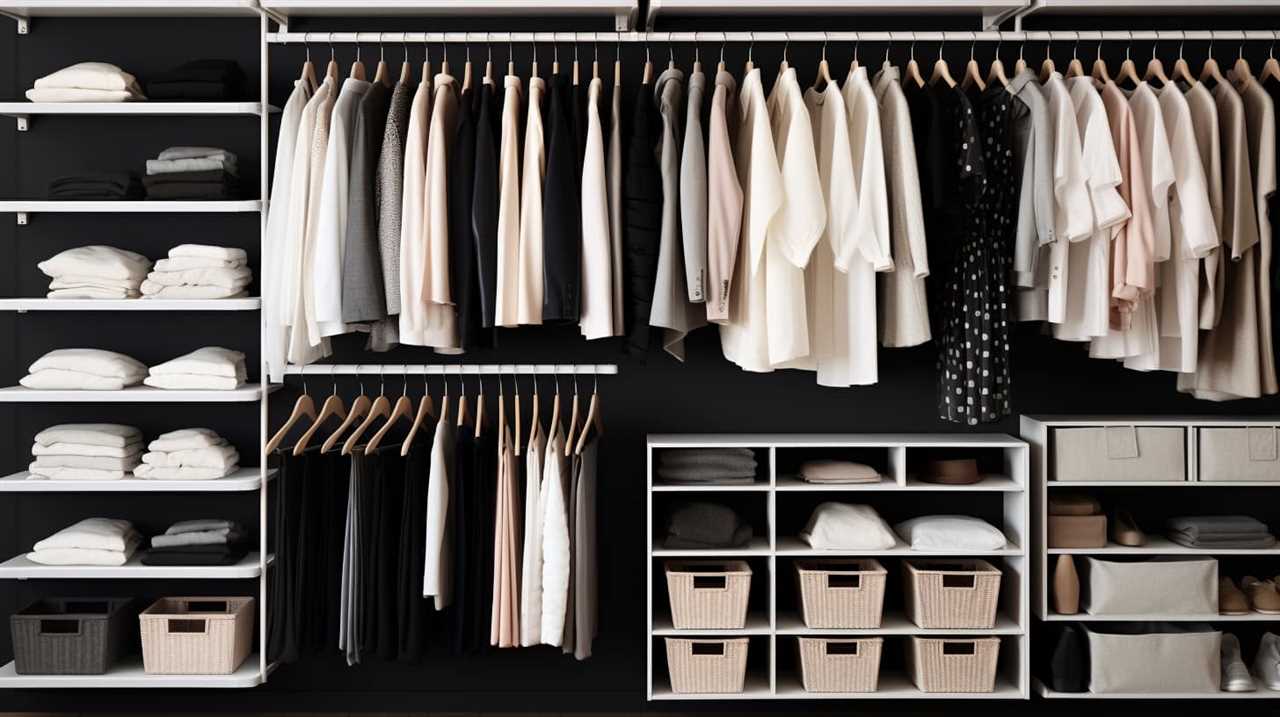
By embracing these sustainable transportation options, we can make a positive impact on the environment while enjoying the convenience and benefits they offer.
Let’s choose a greener way to commute and travel!
Incorporating Eco-Friendly Practices in Your Daily Routines
By reducing waste and recycling, we can actively contribute to a more sustainable and eco-friendly lifestyle. But there are other daily routines we can incorporate to further our efforts.
One way is by using eco-friendly beauty products. These products are made with natural and organic ingredients, free from harmful chemicals and toxins. By choosing these products, we not only reduce our exposure to harmful substances, but also support companies that prioritize sustainability and ethical practices.

Another important practice is reducing water consumption. We can start by turning off the faucet while brushing our teeth, taking shorter showers, and fixing any leaks. Conserving water helps protect this precious resource and reduce our environmental impact.
Now, let’s move on to the next section and explore the importance of choosing sustainable and ethically sourced food options.
Choosing Sustainable and Ethically Sourced Food Options
As we strive to live a minimalist and eco-friendly lifestyle, it’s important for us to prioritize choosing sustainable and ethically sourced food options. By making conscious decisions about the food we consume, we can have a positive impact on the environment and support ethical farming practices.
Here are three ways to incorporate sustainable and ethically sourced food options into our daily lives:

-
Choose locally grown and seasonal produce: Opting for fruits and vegetables that are in season not only ensures freshness and flavor but also reduces the carbon footprint associated with long-distance transportation.
-
Support organic and regenerative farming: Look for labels such as ‘certified organic’ or ‘regeneratively grown’ when buying food. These farming practices prioritize soil health, biodiversity, and use of natural resources.
-
Buy from sustainable seafood sources: When it comes to seafood, choose options that are sustainably and responsibly harvested. Look for labels like MSC (Marine Stewardship Council) or ASC (Aquaculture Stewardship Council) to ensure you’re making ethical choices.
Making these small changes in our food choices can have a big impact on our environment and support the well-being of farmers and producers. Let’s embrace ethical farming and seasonal eating for a healthier and more sustainable future.
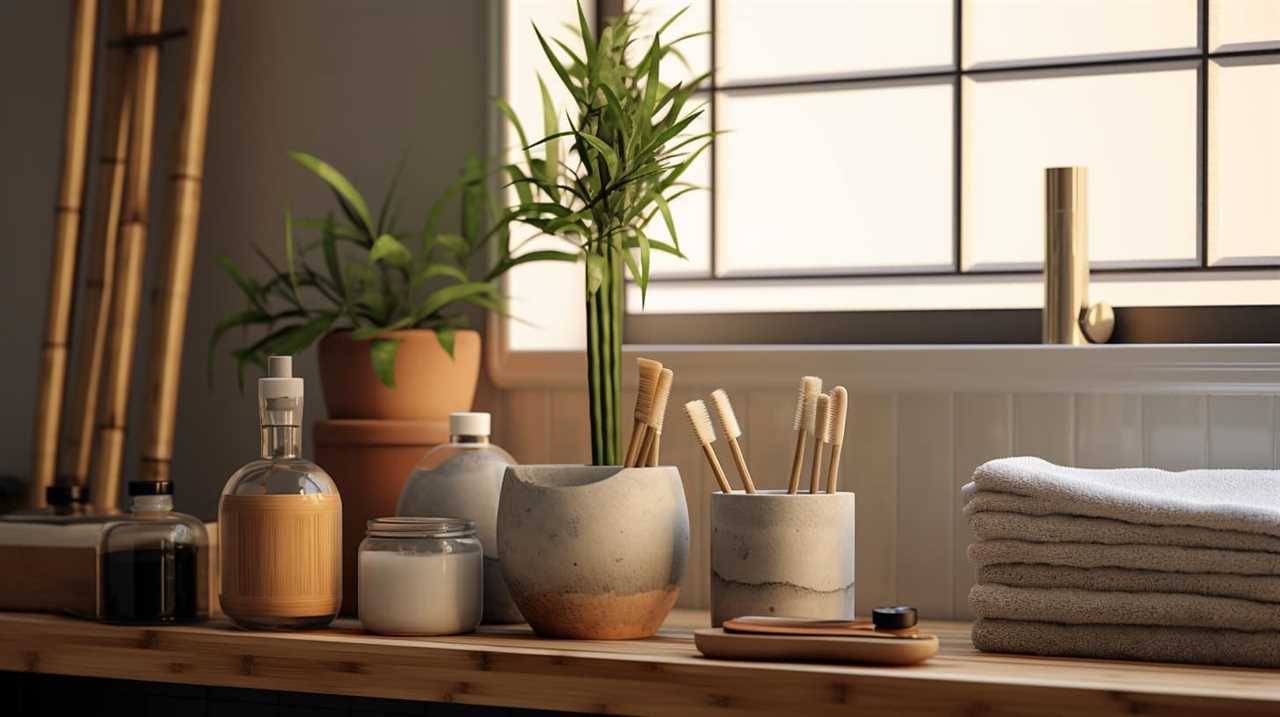
Implementing Energy-Saving Techniques in Your Home
Let’s talk about how we can make our homes more energy-efficient.
One way is by using efficient lighting options, such as LED bulbs, which consume less energy and last longer.
Another technique is installing a smart thermostat, which allows us to control the temperature and save energy when we’re not at home.
Lastly, adding insulation to our homes can help conserve energy by keeping the indoor temperature stable.

Let’s implement these energy-saving techniques and make our homes more eco-friendly.
Efficient Lighting Options
We can maximize energy efficiency in our homes by utilizing efficient lighting options. Here are some ways to achieve this:
-
Switch to LED lighting options: LED bulbs use significantly less energy than traditional incandescent bulbs, making them a more sustainable choice for your home.
-
Utilize natural light: Make the most of natural light by keeping curtains open during the day and strategically placing mirrors to reflect light into darker areas. This will reduce the need for artificial lighting during daylight hours.

-
Install dimmer switches: Dimmer switches allow you to adjust the brightness of your lights according to your needs, saving energy when full brightness isn’t required.
By embracing these efficient lighting options, we can reduce our energy consumption and contribute to a more sustainable future.
Now, let’s explore the benefits of implementing smart thermostats in our homes.
Smart Thermostat Benefits
To truly optimize energy usage and reduce our environmental impact, we should consider the benefits of implementing smart thermostats in our homes.

Smart thermostat installation is a simple yet effective way to save energy and lower our utility bills. These devices allow us to control the temperature of our homes remotely, ensuring that we only use energy when needed. They also offer features like programmable schedules, which can automatically adjust the temperature based on our daily routines.
By using a smart thermostat, we can easily follow energy saving tips for home, such as setting higher temperatures during the summer or lower temperatures during the winter when we aren’t at home. This not only helps us save money but also reduces our carbon footprint.
Now, let’s explore another technique for energy conservation: insulation.
Insulation for Energy Conservation
And if we want to further reduce our energy consumption and create a more eco-friendly home, insulation is a key technique we should consider. Proper insulation can help us save energy and money by keeping our homes warm in winter and cool in summer.

Here are three reasons why insulation is essential for energy-efficient homes:
-
Energy Savings: Insulation materials such as fiberglass, cellulose, and foam can significantly reduce heat transfer, preventing the need for excessive heating or cooling. This leads to lower energy consumption and reduced utility bills.
-
Comfortable Living: Insulation creates a barrier against outdoor temperature fluctuations, making our homes more comfortable year-round. It helps maintain a consistent indoor temperature and reduces drafts and cold spots.
-
Environmental Impact: By reducing our energy consumption, insulation contributes to a greener and more sustainable lifestyle. It helps reduce greenhouse gas emissions and our carbon footprint.

Considering these benefits, investing in proper insulation is a practical and effective way to create an energy-efficient and eco-friendly home.
Supporting Local and Eco-Conscious Businesses
By shopping at local and eco-conscious businesses, we can contribute to a more sustainable and community-oriented economy. Supporting local farmers helps to reduce the carbon footprint associated with long-distance transportation of goods and also ensures the freshness and quality of the produce we consume. Additionally, choosing eco-friendly product alternatives reduces our reliance on harmful chemicals and materials that can harm both our health and the environment.
Here is a table showcasing some ways we can support local and eco-conscious businesses:
| Ways to Support | Examples |
|---|---|
| Shop at farmers markets | Purchase locally grown fruits and vegetables |
| Buy from eco-friendly stores | Choose products made from recycled materials |
| Support small businesses | Purchase handmade or locally produced items |
| Use community-supported agriculture (CSA) | Sign up for a CSA program to receive fresh produce directly from local farms |
Emphasizing Quality Over Quantity in Your Purchasing Decisions
When it comes to our purchasing decisions, it’s important to prioritize quality over quantity.

By being mindful consumers, we can make sustainable buying habits that have a positive impact on the environment.
Conscious consumption means considering the long-term effects of our choices and investing in products that are built to last, reducing waste and promoting a minimalist lifestyle.
Mindful Consumer Choices
As we strive for a more minimalist and eco-friendly lifestyle, it’s crucial to make mindful consumer choices. One way to do this is by emphasizing quality over quantity in our purchasing decisions. By practicing ethical consumerism and opting for sustainable product alternatives, we can make a positive impact on both our own well-being and the environment.
Here are three key ways to make mindful consumer choices:

-
Research and Support Ethical Brands: Look for companies that prioritize sustainable practices, fair trade, and ethical sourcing. By supporting these brands, we can encourage others to follow suit and create a more sustainable market.
-
Invest in Durable and Long-lasting Products: Instead of buying cheap and disposable items, opt for high-quality products that are built to last. This not only reduces waste but also saves money in the long run.
-
Consider Second-hand and Repurposed Goods: Before purchasing something new, explore second-hand options and repurposed items. This not only reduces the demand for new products but also gives new life to pre-loved items.
Sustainable Buying Habits
Our sustainable buying habits should prioritize quality over quantity in our purchasing decisions. By focusing on quality, we can ensure that the products we buy are long-lasting, reducing the need for frequent replacements and ultimately reducing waste. This approach applies to various areas of our lives, including sustainable grocery shopping and eco-friendly home decor.

When it comes to sustainable grocery shopping, we can choose products that are locally sourced and organic, supporting local farmers and reducing the carbon footprint associated with long-distance transportation. Opting for products with minimal packaging or packaging made from recycled materials is another way to reduce waste.
In terms of eco-friendly home decor, investing in high-quality, durable pieces made from sustainable materials such as bamboo or reclaimed wood can significantly reduce our impact on the environment. Additionally, choosing energy-efficient appliances and opting for natural cleaning products can further contribute to an eco-friendly home.
By prioritizing quality over quantity in our purchasing decisions, we can make a positive impact on the environment while also enjoying products that are built to last.
Transitioning into the subsequent section about the ‘impact of conscious consumption’, let’s explore how our buying habits can influence the world around us.

Impact of Conscious Consumption
But, by emphasizing quality over quantity in our purchasing decisions, we can make a significant impact on the environment and our overall lifestyle. Conscious shopping is all about being mindful of the products we buy and their impact on the world. Here are three reasons why prioritizing quality over quantity is essential:
-
Reduced waste: When we choose high-quality, durable items, they last longer and reduce the amount of waste we generate. Instead of buying cheap products that break easily and end up in landfills, we can invest in items that will stand the test of time.
-
Ethical production: By opting for products that are ethically produced, we can support companies that prioritize fair labor practices and sustainable sourcing. This ensures that workers are treated fairly and that the production process doesn’t harm the environment.
-
Cost-effectiveness: Although quality products may initially seem more expensive, they often provide better value in the long run. Investing in durable items saves money on replacements and repairs, making it a financially savvy choice.
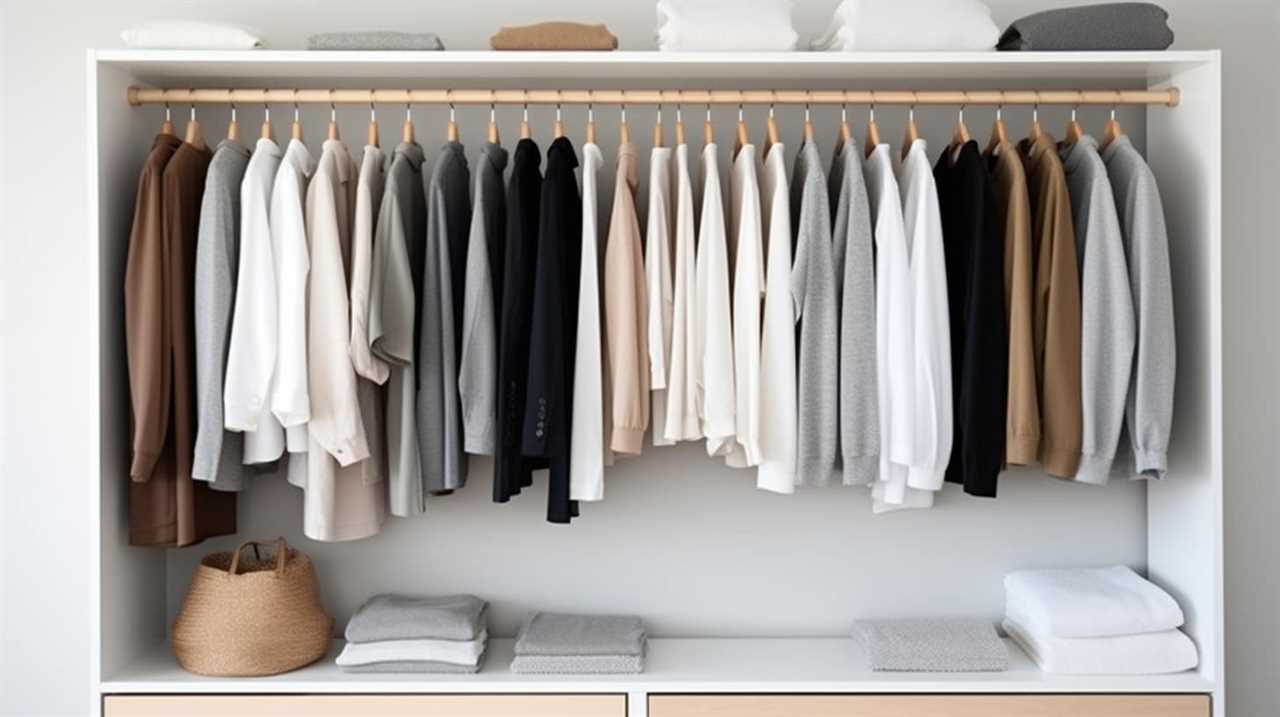
Practicing Mindfulness and Gratitude in Your Everyday Life
Let’s incorporate a daily gratitude practice into our lives to cultivate mindfulness and appreciate the little things. Practicing mindfulness and gratitude can have a profound impact on our overall well-being and help us live a more fulfilling and eco-friendly lifestyle.
One way to incorporate mindfulness into our daily routine is through mindful eating. By paying attention to the colors, textures, and flavors of our food, we can fully enjoy and savor each bite. This not only helps us to be more present in the moment, but it also encourages us to make healthier and more conscious food choices.
Another way to cultivate gratitude is through journaling. Taking a few minutes each day to write down the things we’re grateful for can shift our focus towards the positive aspects of our lives and help us appreciate the abundance around us.
Frequently Asked Questions
How Can I Incorporate Eco-Friendly Practices Into My Daily Routines?
We can incorporate eco-friendly practices into our daily routines by using green cleaning products and implementing tips for reducing food waste. These small changes make a big impact on the environment and help create a more sustainable lifestyle.

What Are Some Sustainable Transportation Options I Can Use?
Looking for sustainable transportation options? Bicycles and electric scooters are great for short distances, while public transportation and carpooling reduce emissions and save money. Let’s explore these eco-friendly choices together!
How Can I Simplify My Living Space?
To simplify our living space, we can start by decluttering and utilizing minimalist home decor. This will create a calm and organized environment, allowing us to focus on what truly matters and reducing our carbon footprint.
What Are Some Energy-Saving Techniques I Can Implement in My Home?
We can save energy in our homes by implementing solar panel installation and smart home automation. These techniques not only reduce our carbon footprint but also help us save money on electricity bills.
How Can I Support Local and Eco-Conscious Businesses?
Looking to support local and eco-conscious businesses? We’ve got you covered! Discover how to find them and show your financial support. Let’s make a difference together and create a sustainable future.
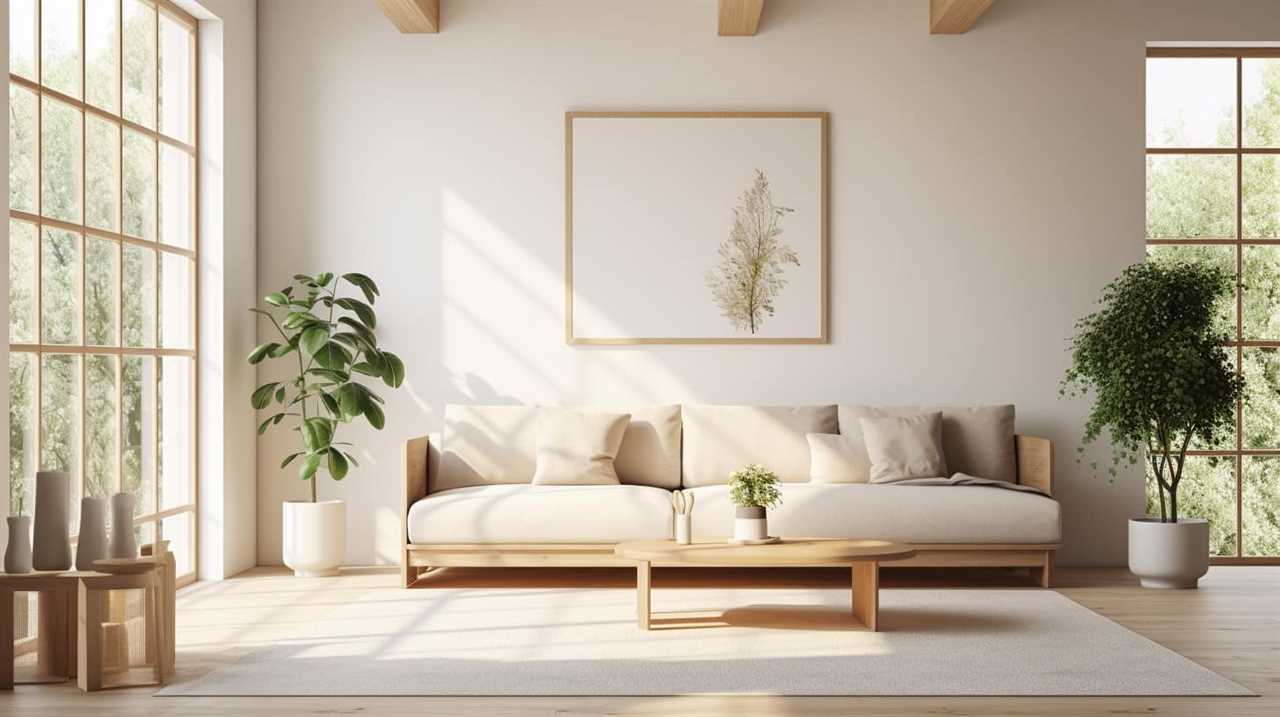
Conclusion
In conclusion, by simplifying our living spaces, embracing minimalism in our wardrobes, and adopting a zero-waste lifestyle, we can create a minimalist and eco-friendly lifestyle.
Additionally, by utilizing sustainable transportation options, incorporating eco-friendly practices, and implementing energy-saving techniques, we can further reduce our environmental impact.
Moreover, supporting local and eco-conscious businesses, emphasizing quality over quantity, and practicing mindfulness and gratitude can contribute to a more sustainable future.
Let’s choose to make small changes today that will have a big impact on our planet tomorrow.
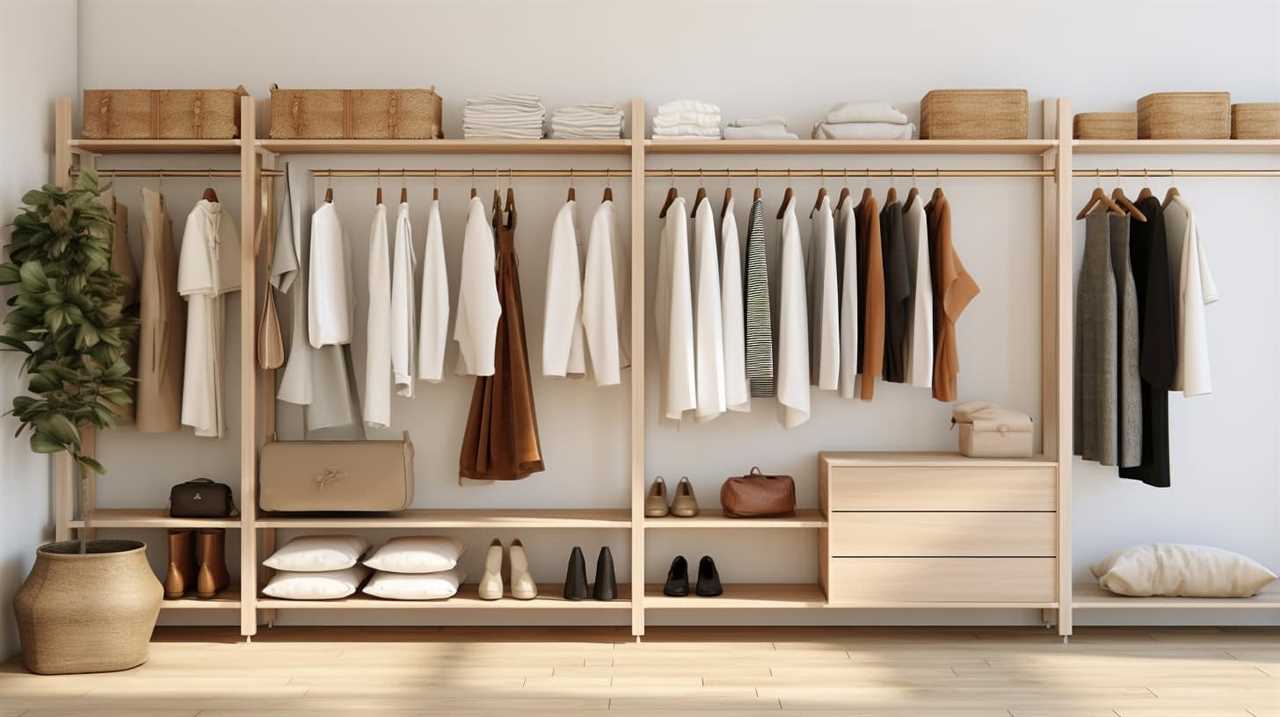
Together, we can build a better and more sustainable future.
I’m Theodore, and I love tiny houses. In fact, I’m the author of Tiny House 43, a book about tiny houses that are also tree houses. I think they’re magical places where imaginations can run wild and adventures are just waiting to happen.
While tree houses are often associated with childhood, they can be the perfect adult retreat. They offer a cozy space to relax and unwind, surrounded by nature. And since they’re typically built on stilts or raised platforms, they offer stunning views that traditional homes simply can’t match.
If you’re looking for a unique and romantic getaway, a tree house tiny house might just be the perfect option.
-

 Beginners Guides3 months ago
Beginners Guides3 months agoHow To Buy A Tesla Tiny House
-

 Energy Efficiency4 weeks ago
Energy Efficiency4 weeks agoBest Tiny Homes For Cold Climates
-
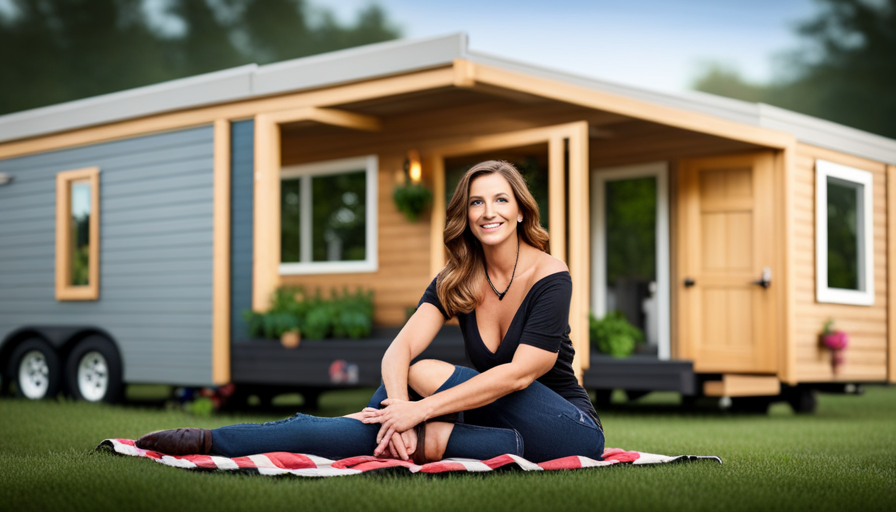
 Beginners Guides3 months ago
Beginners Guides3 months agoTiny House Nation Where Are They Now Stephanie
-

 Tiny House Resources (e.g., legalities, cost, insurance, FAQs)1 month ago
Tiny House Resources (e.g., legalities, cost, insurance, FAQs)1 month agoDo Tiny Homes Need Planning Permission?
-

 Beginners Guides3 months ago
Beginners Guides3 months agoFrom The Show Tiny House Nation How Many Keep Their Tiny House?
-

 Beginners Guides1 month ago
Beginners Guides1 month agoUsing a Climbing Net For Treehouse Construction
-

 Beginners Guides1 month ago
Beginners Guides1 month agoHow to Build a Treehouse Without Drilling Into the Tree
-

 Beginners Guides1 month ago
Beginners Guides1 month agoHow to Build a Treehouse Rope Bridge














